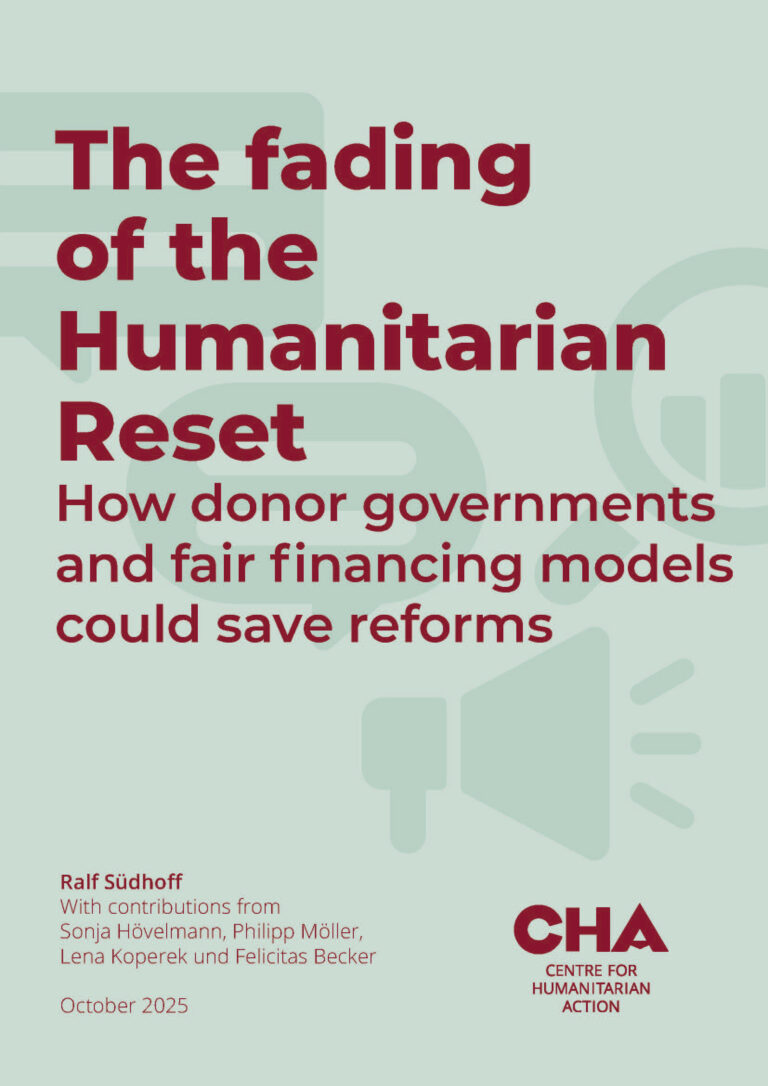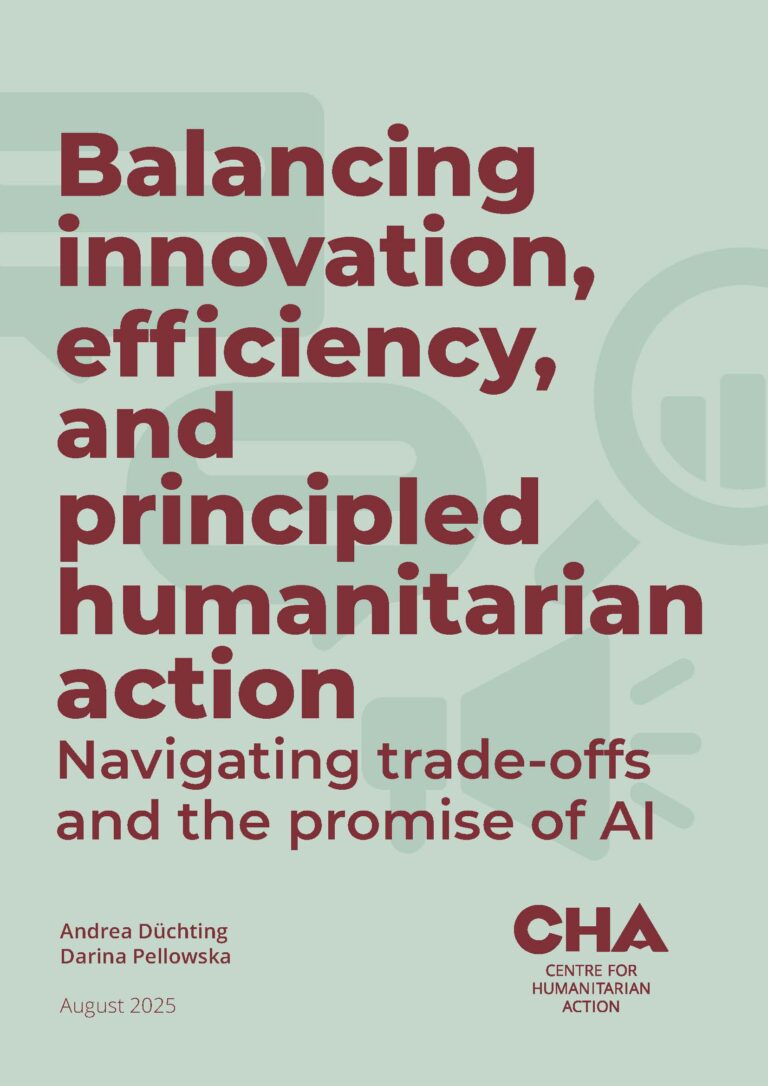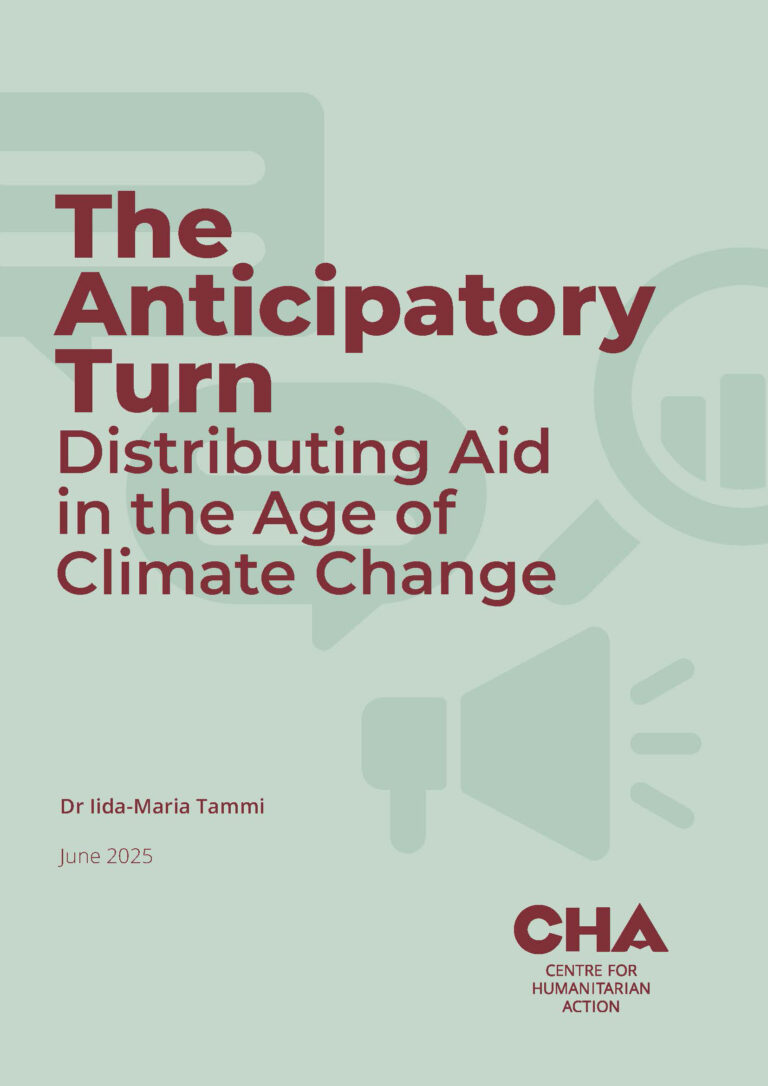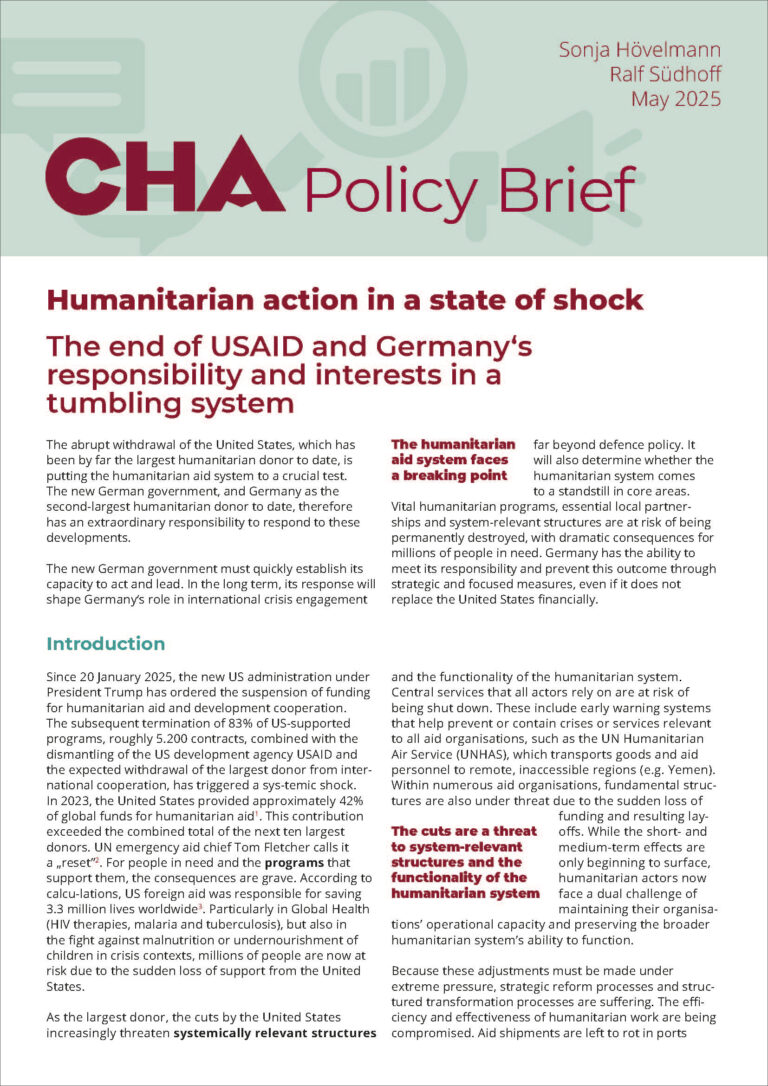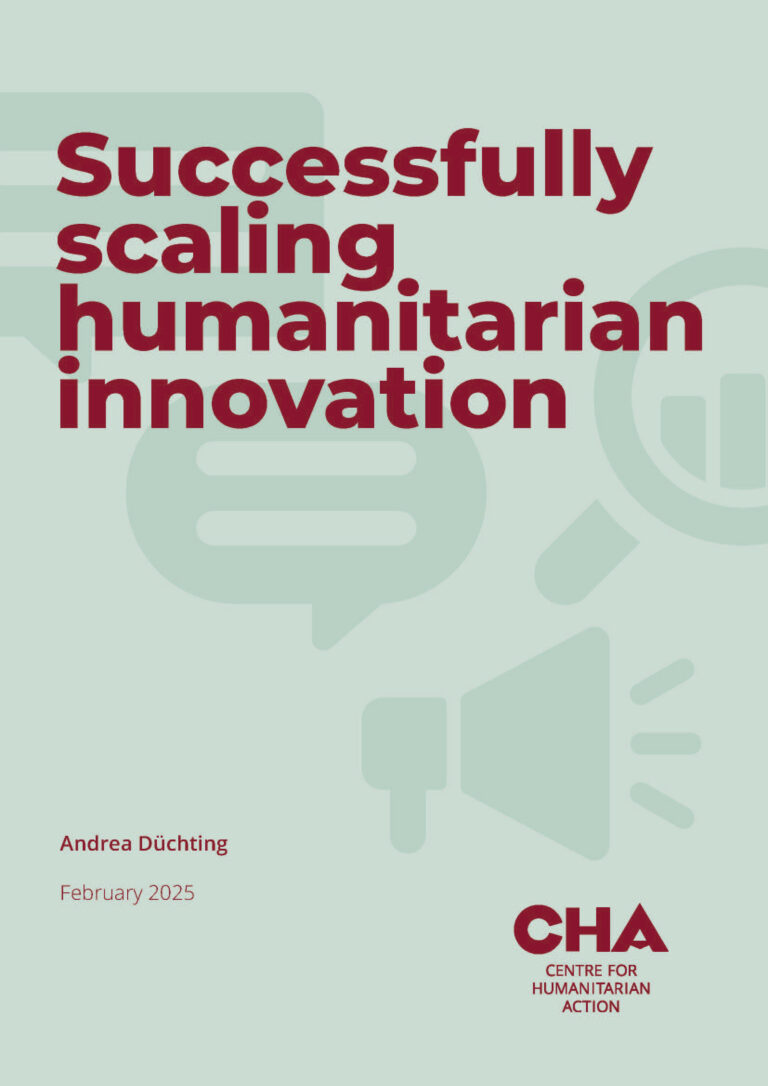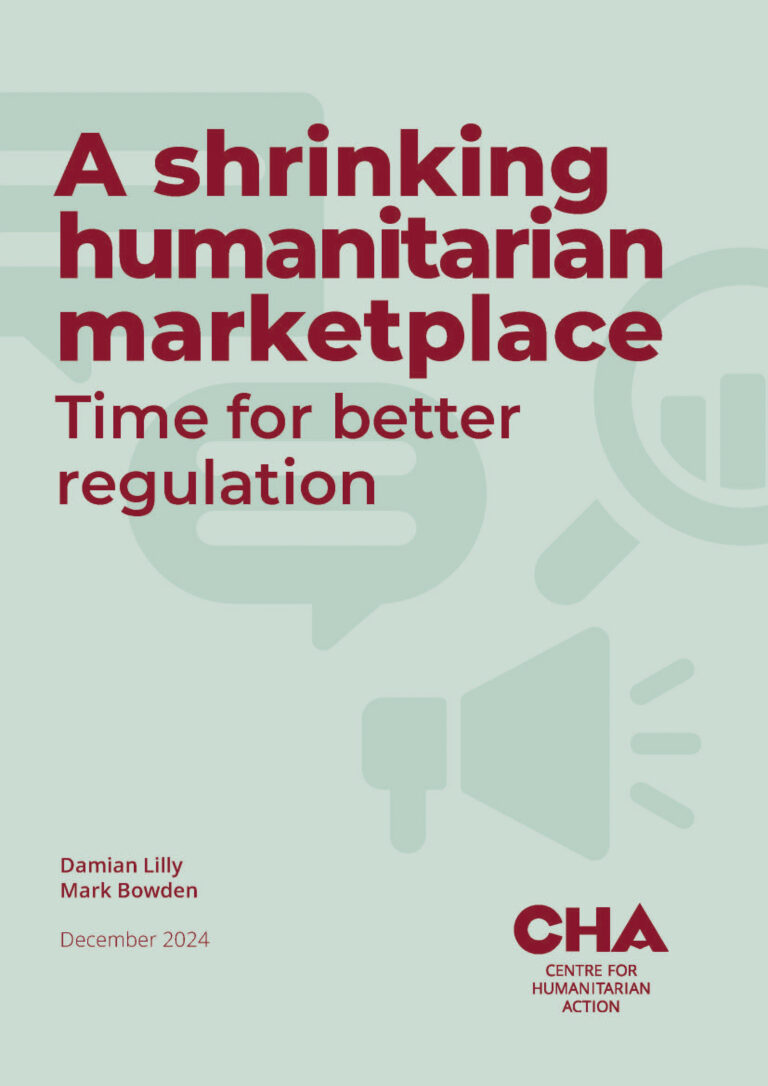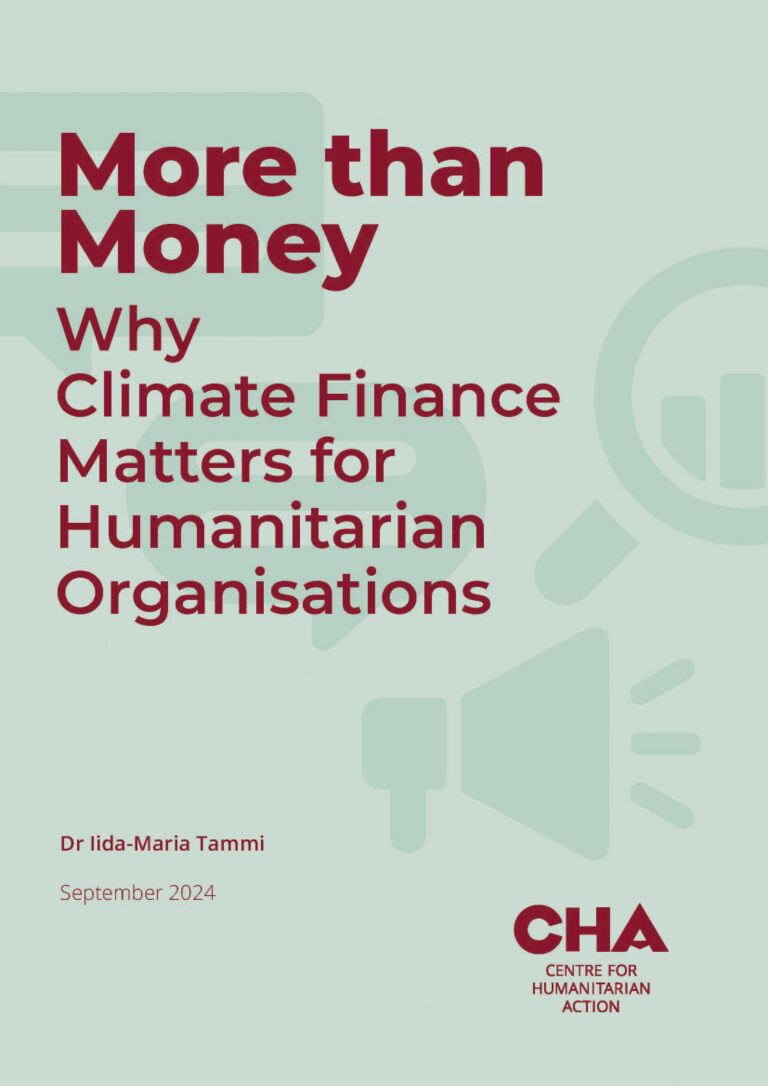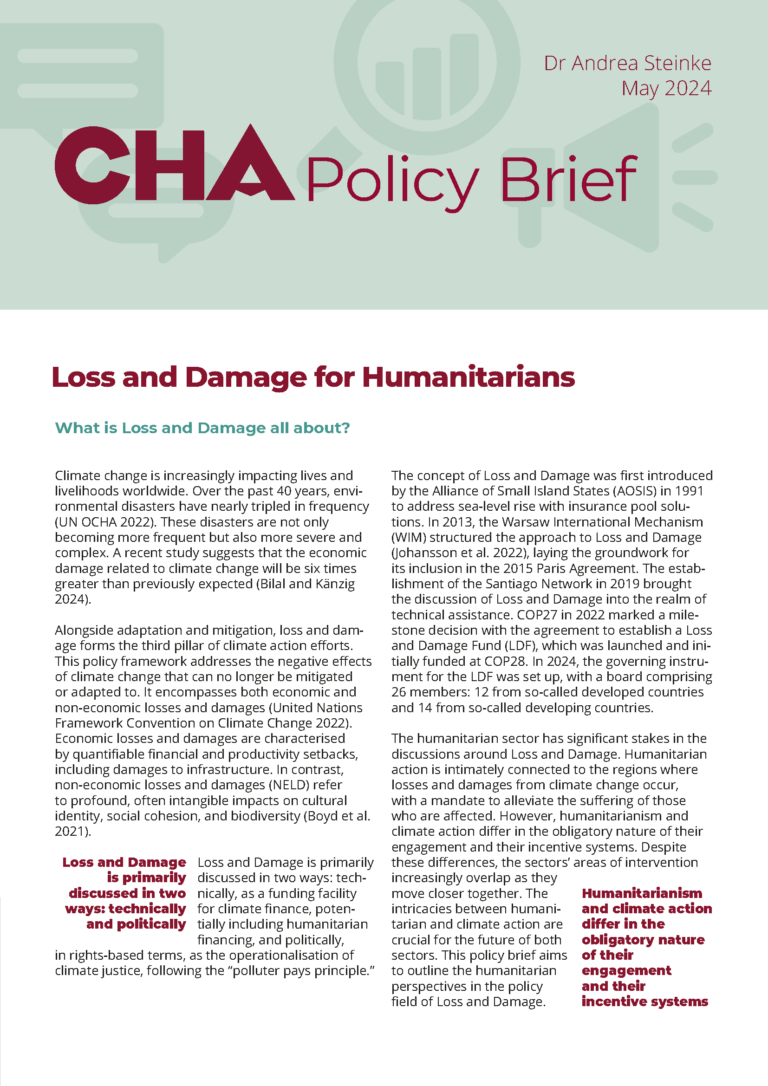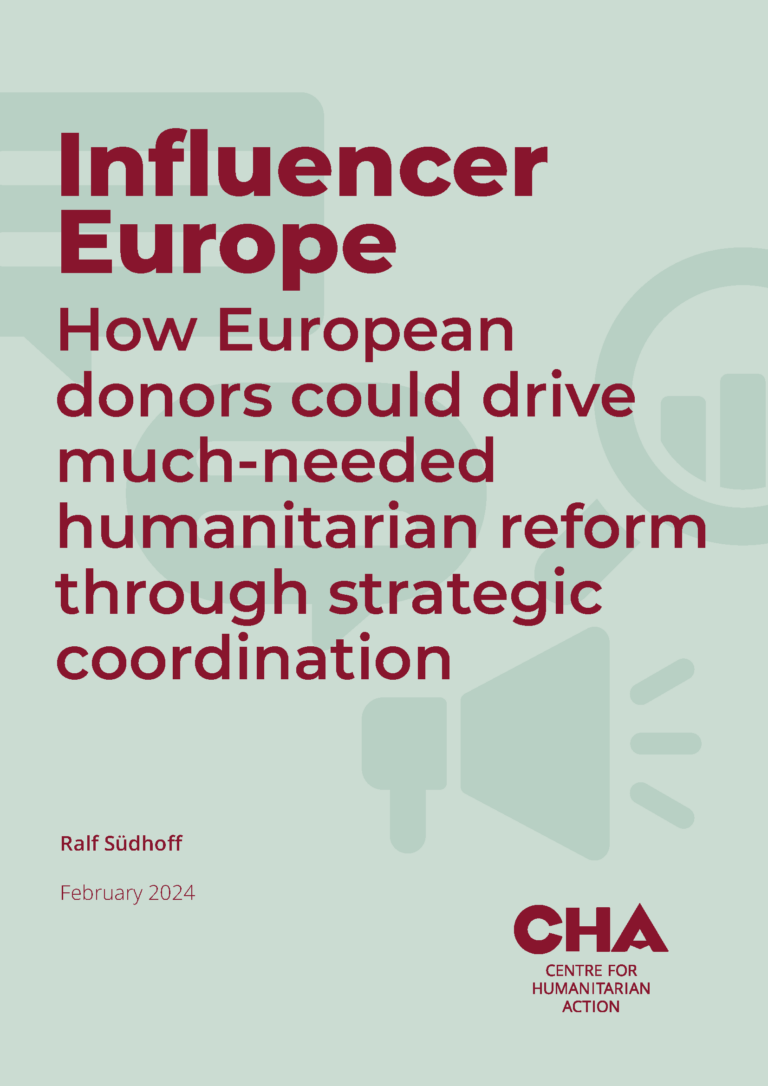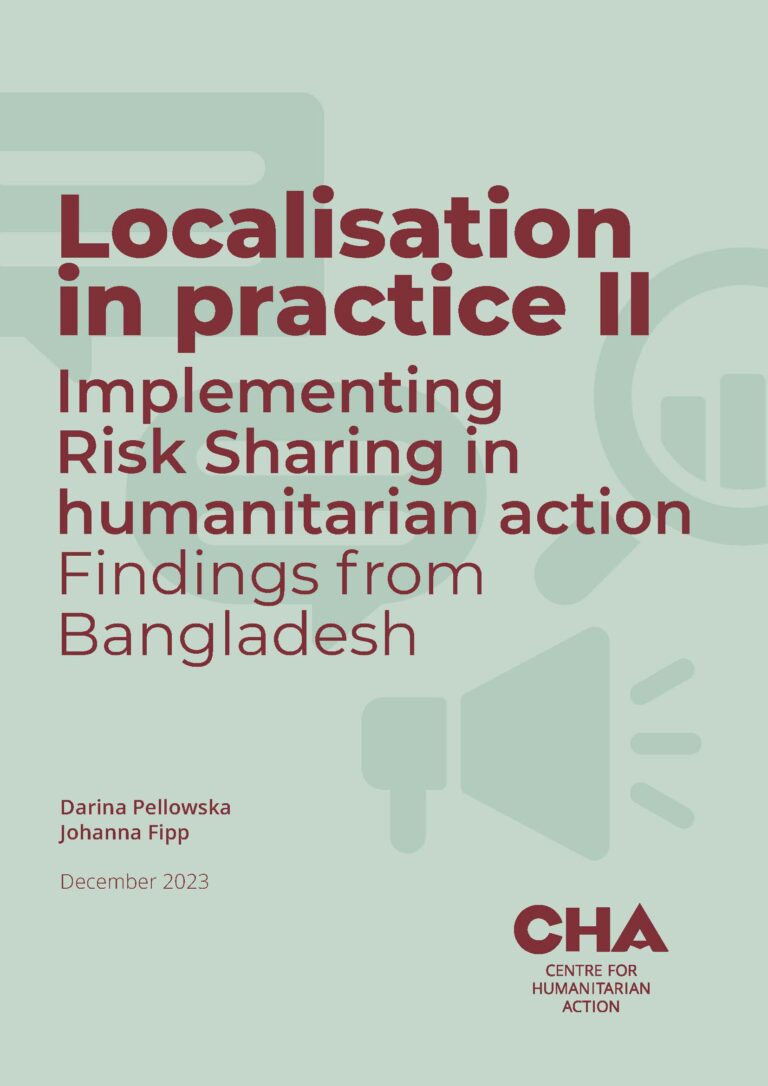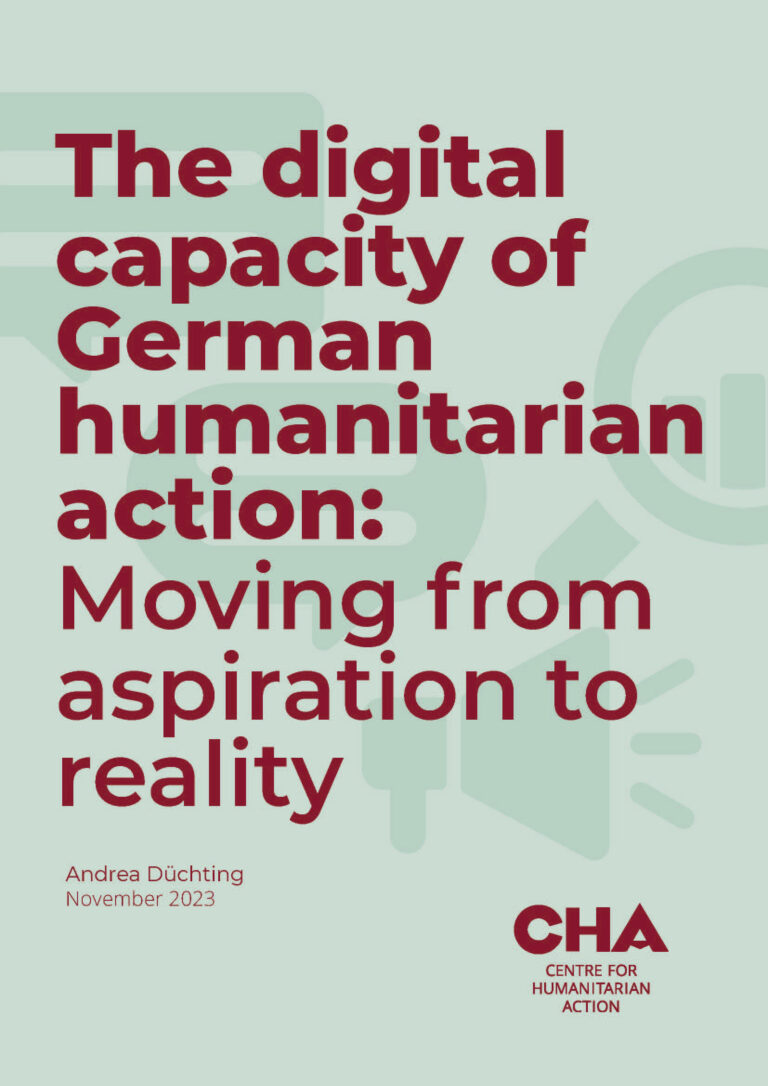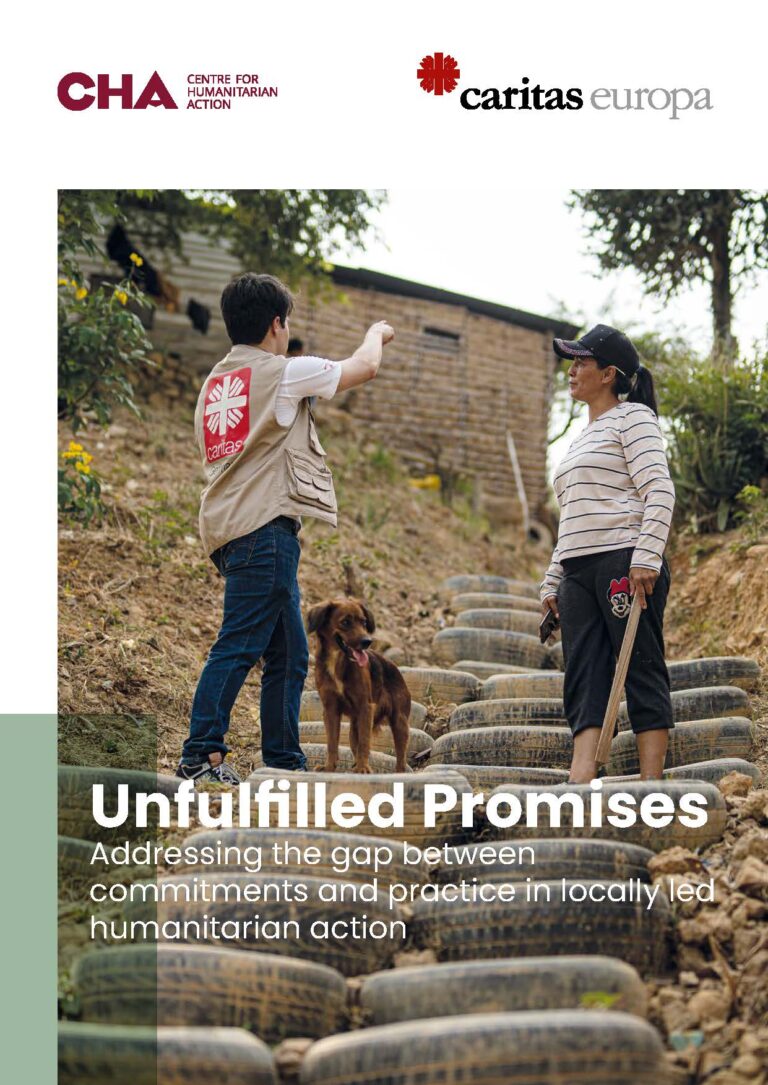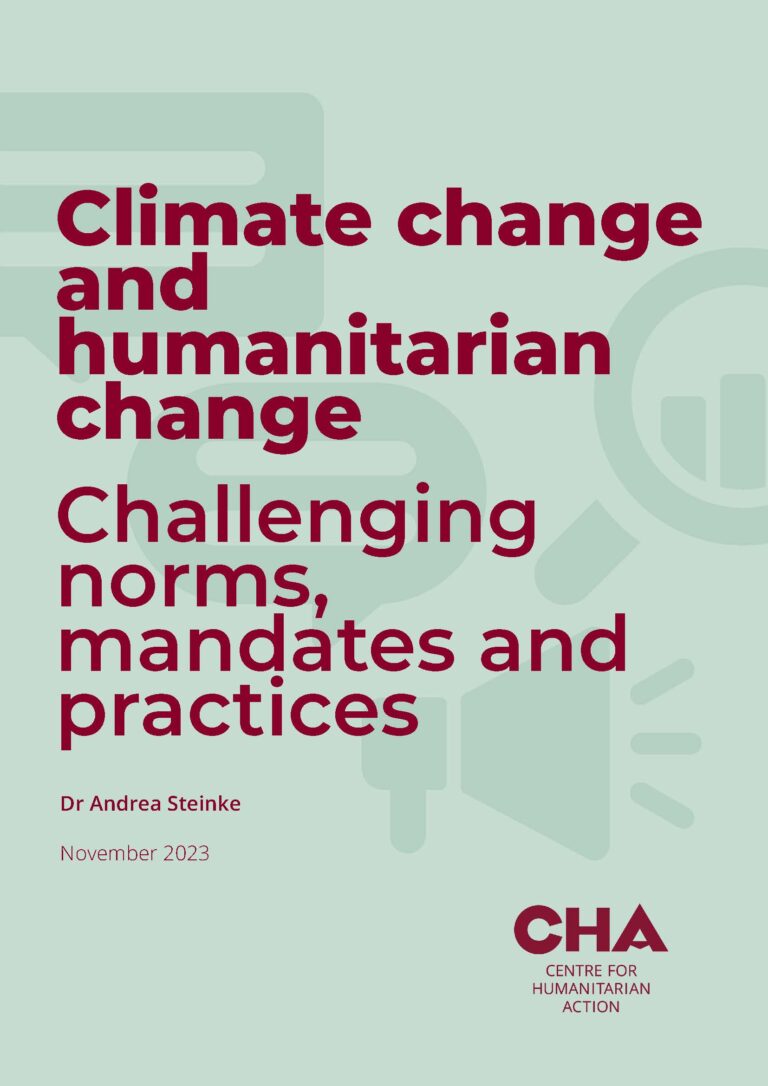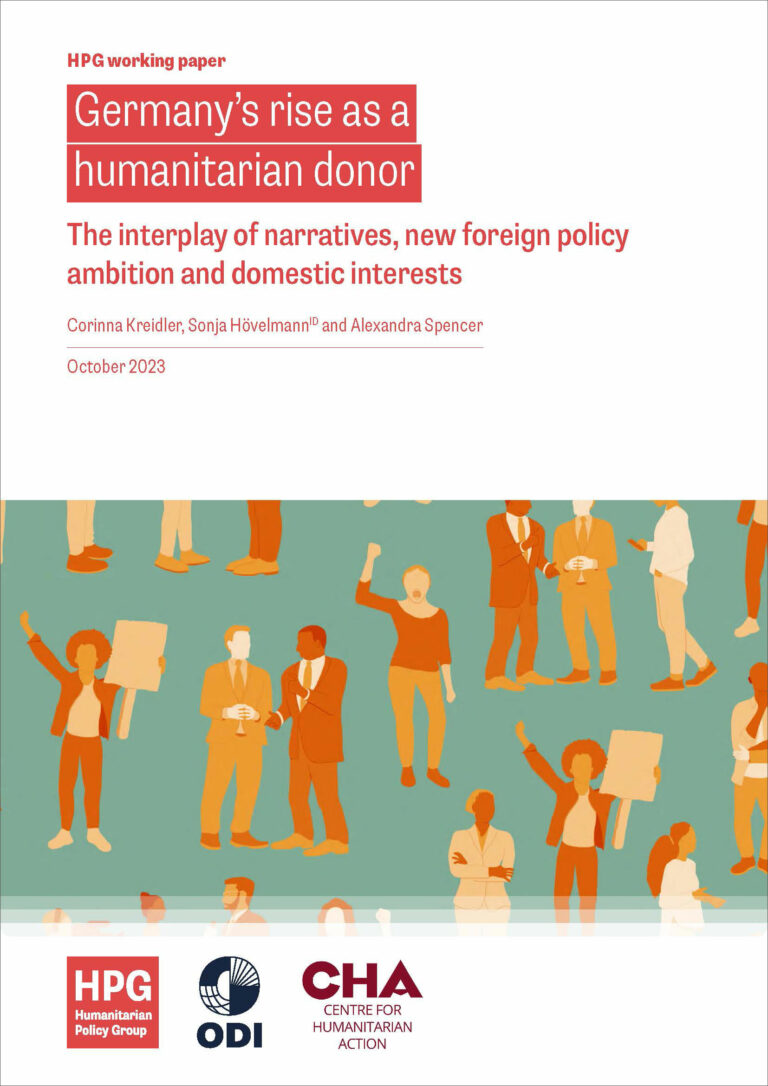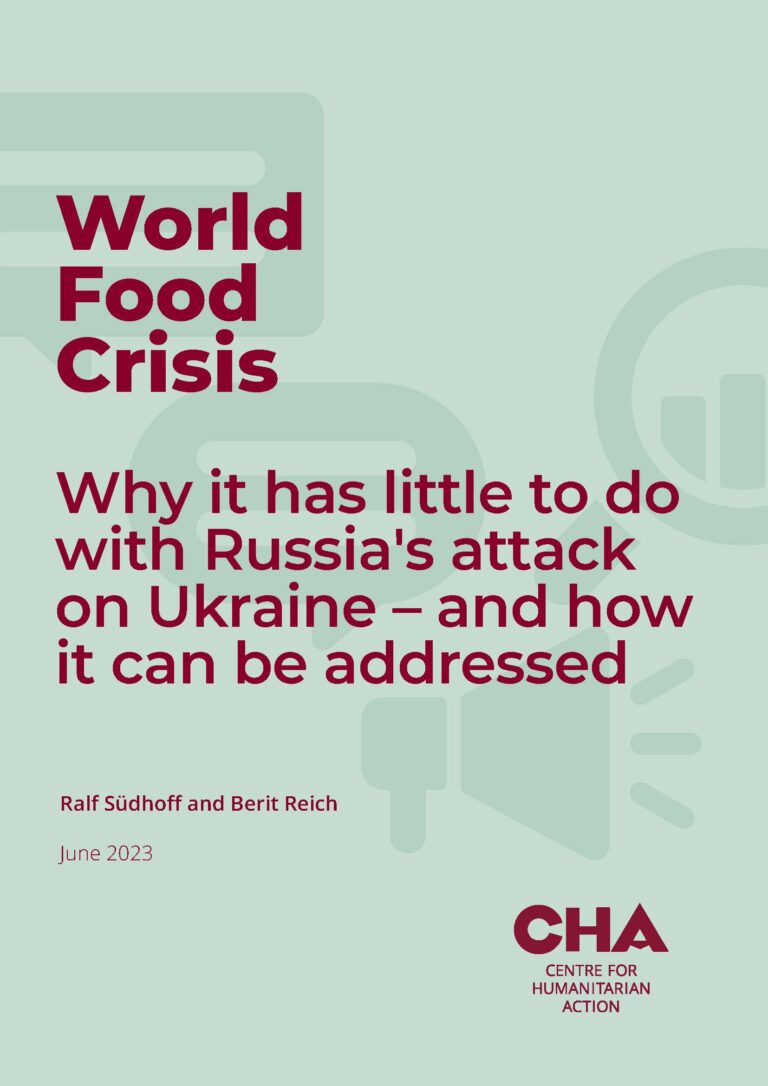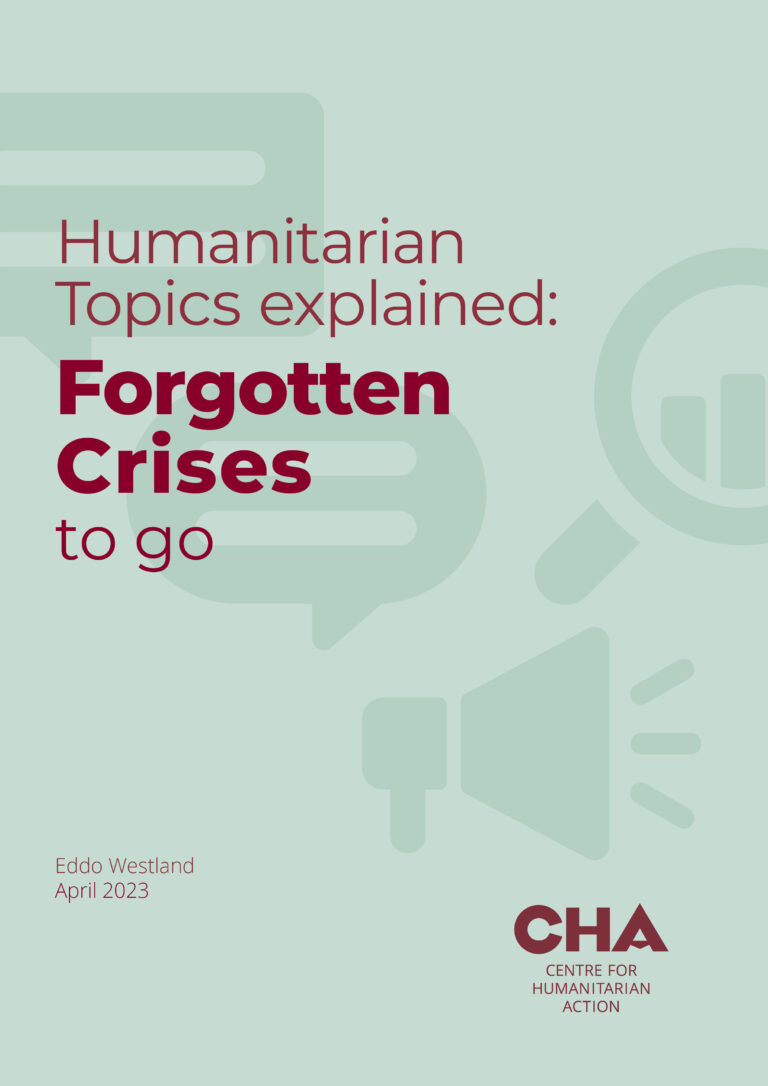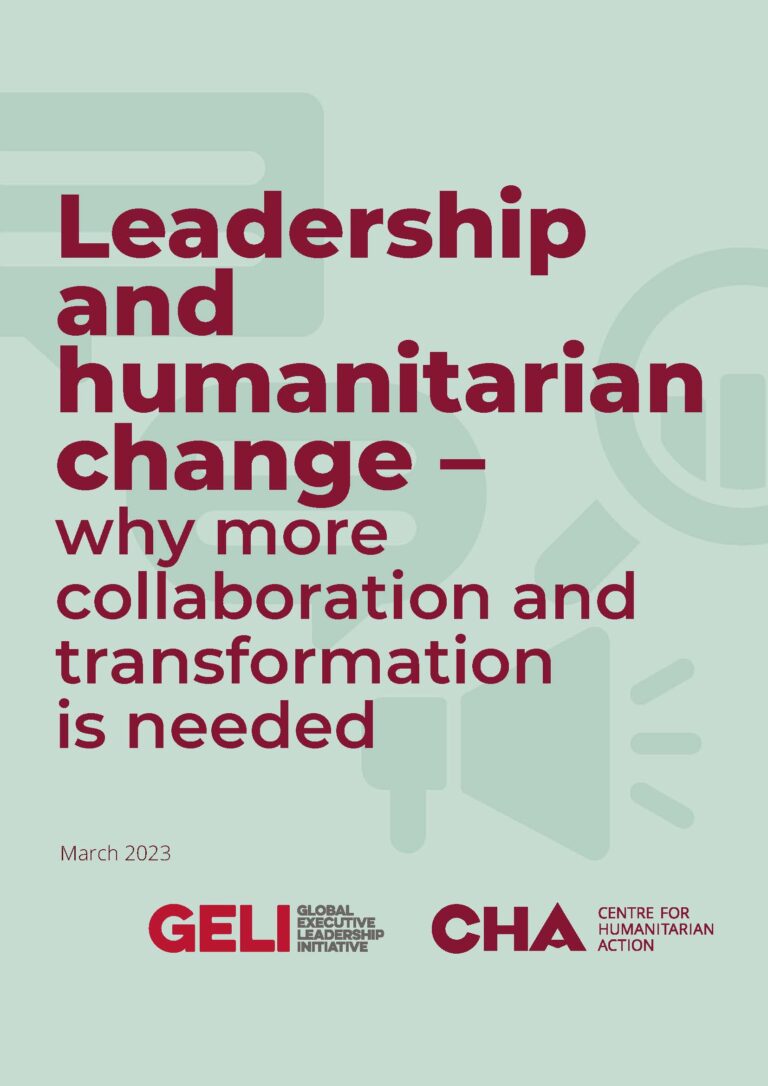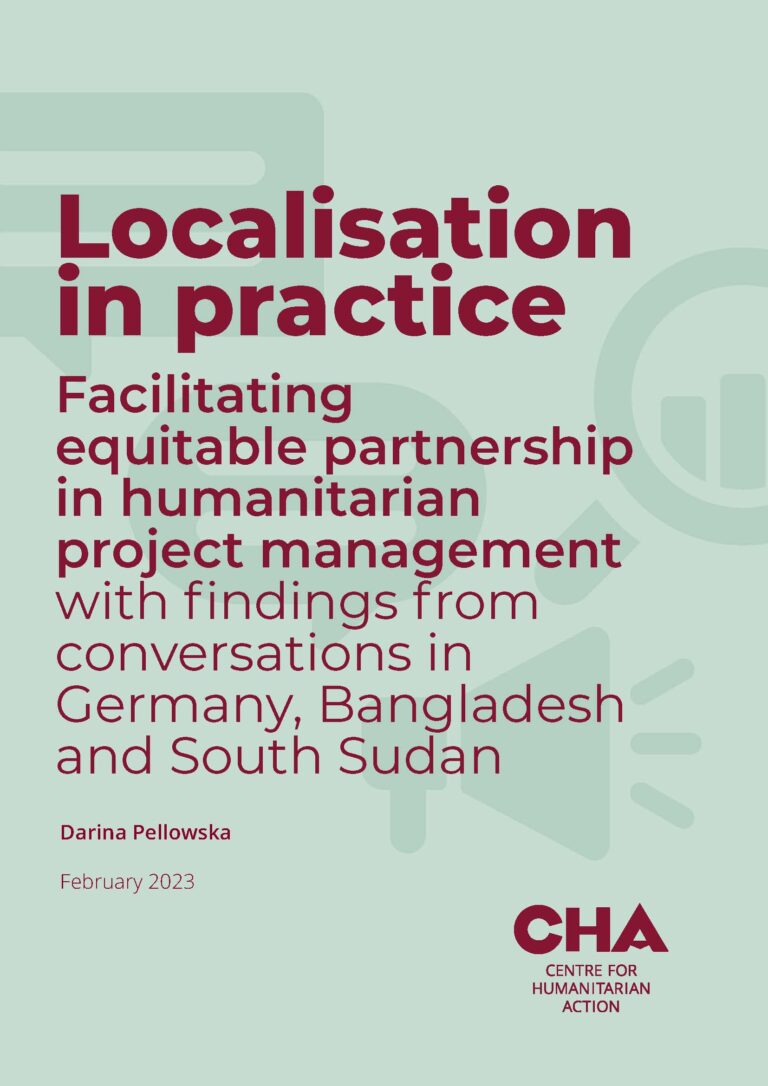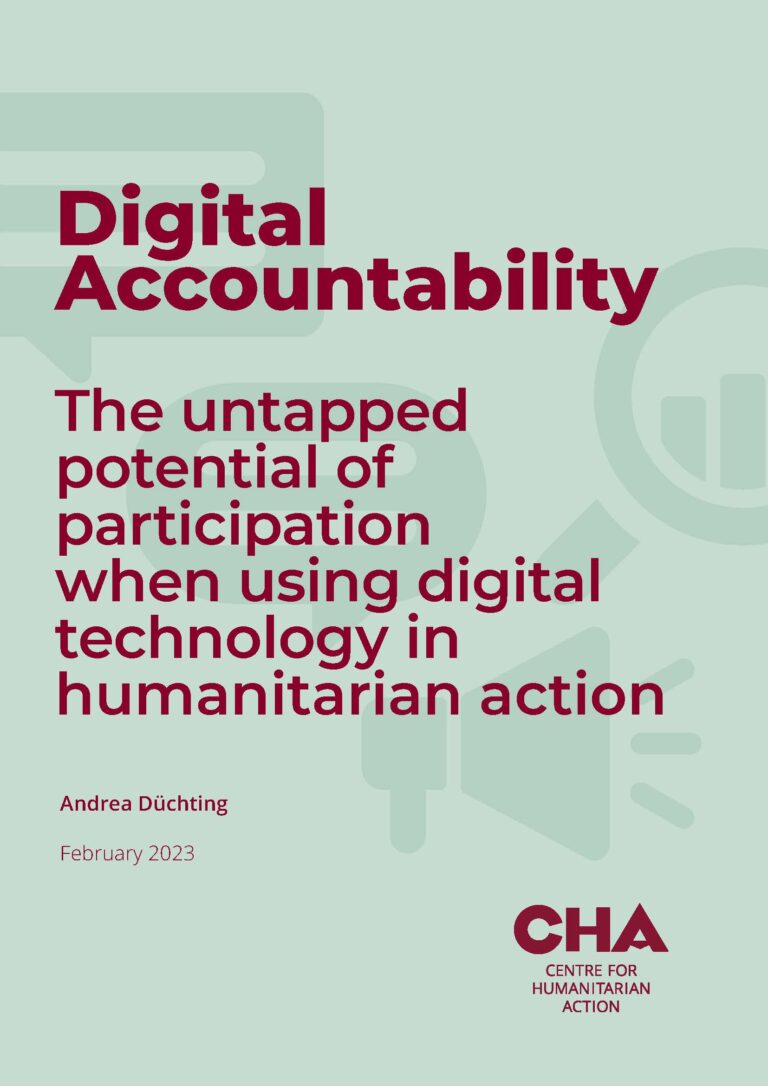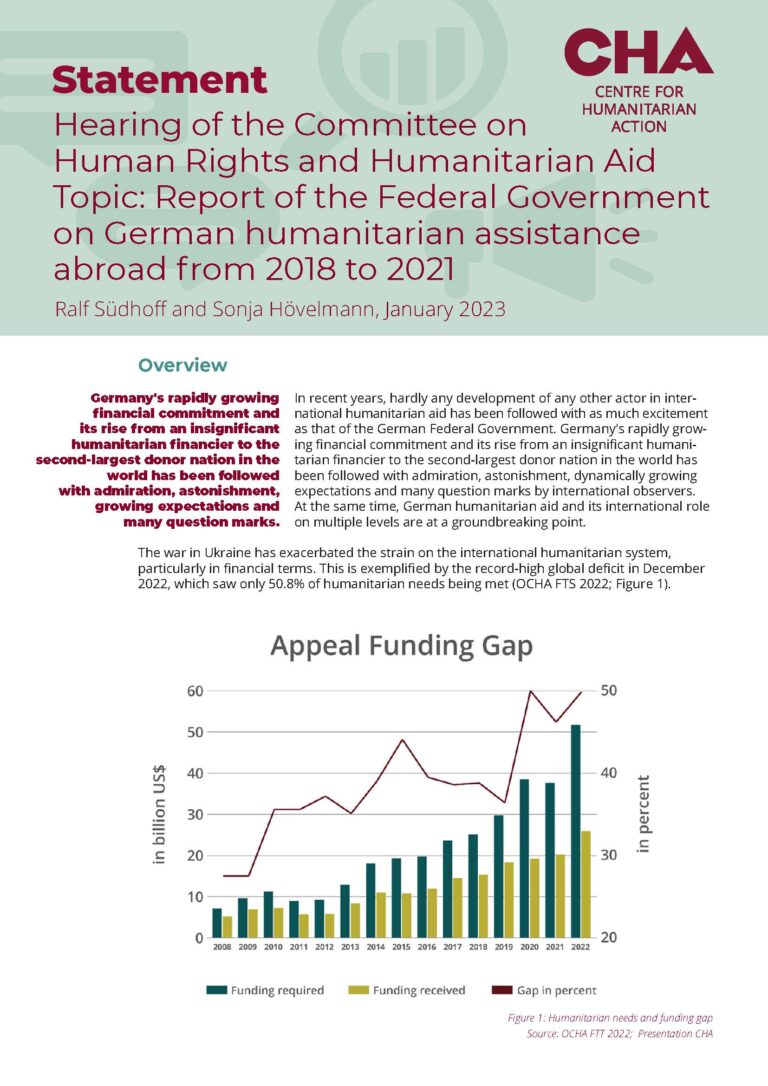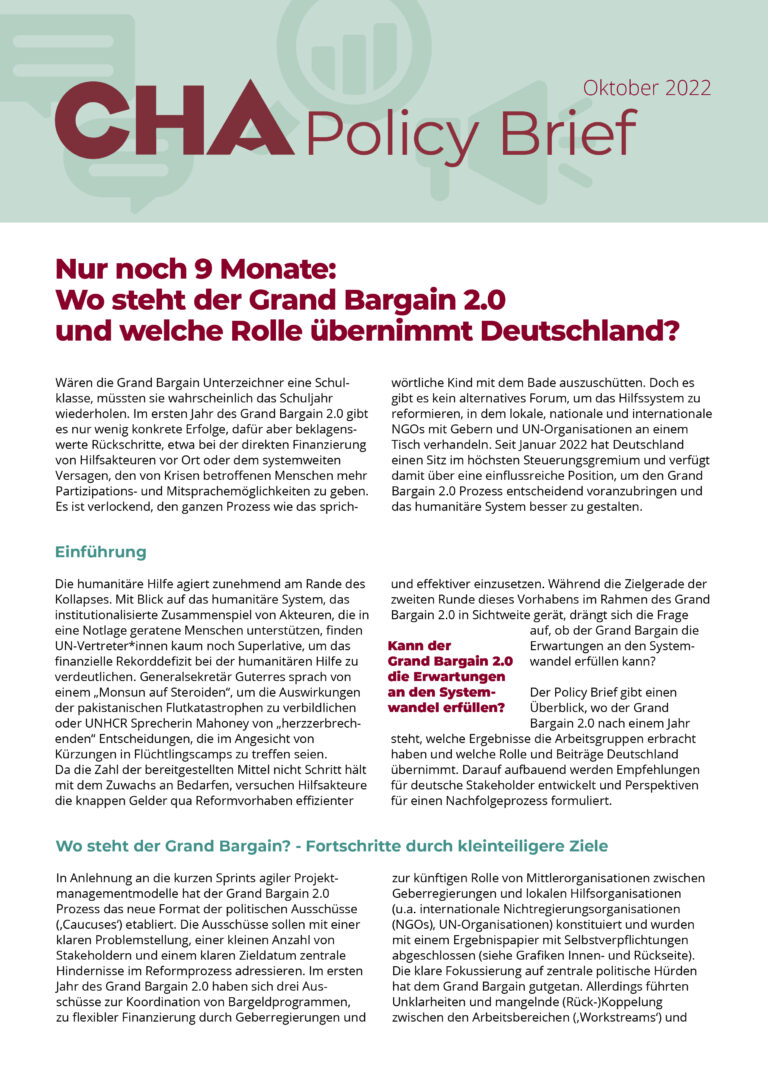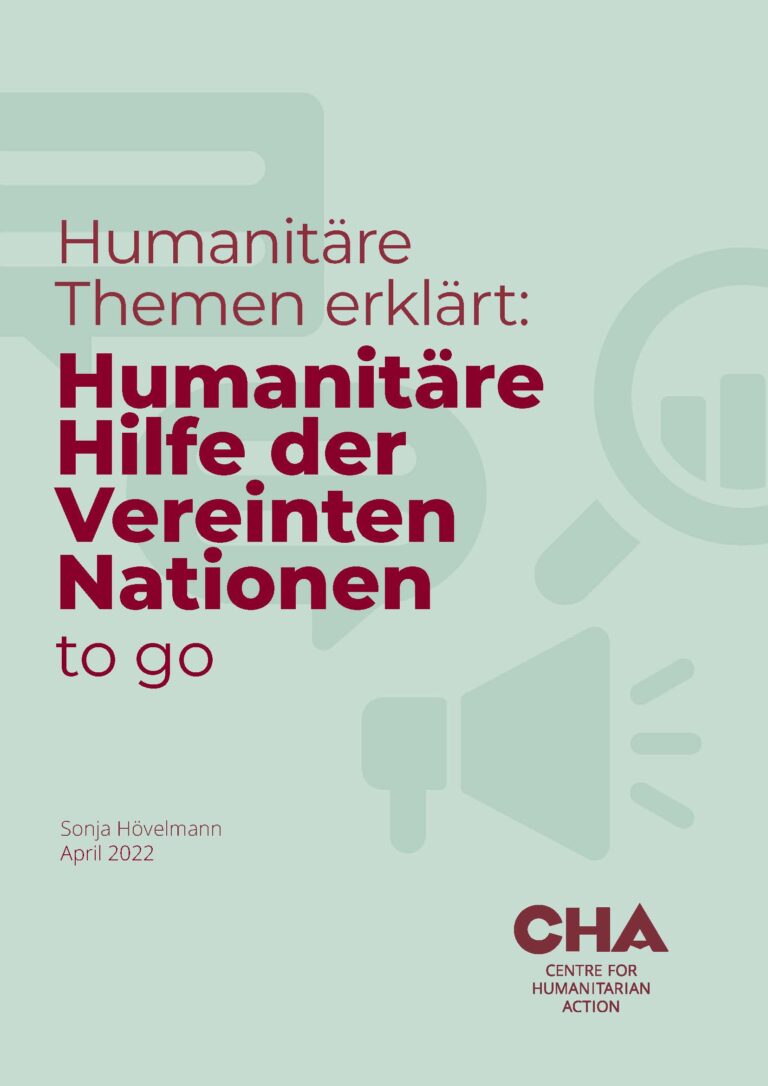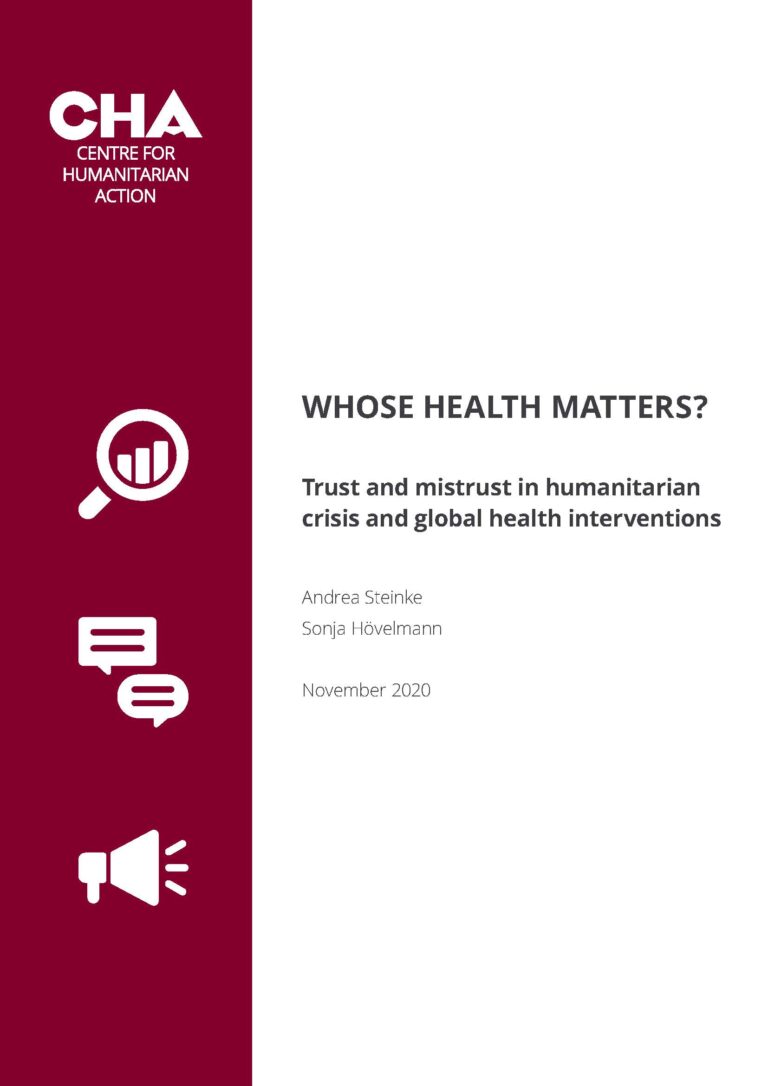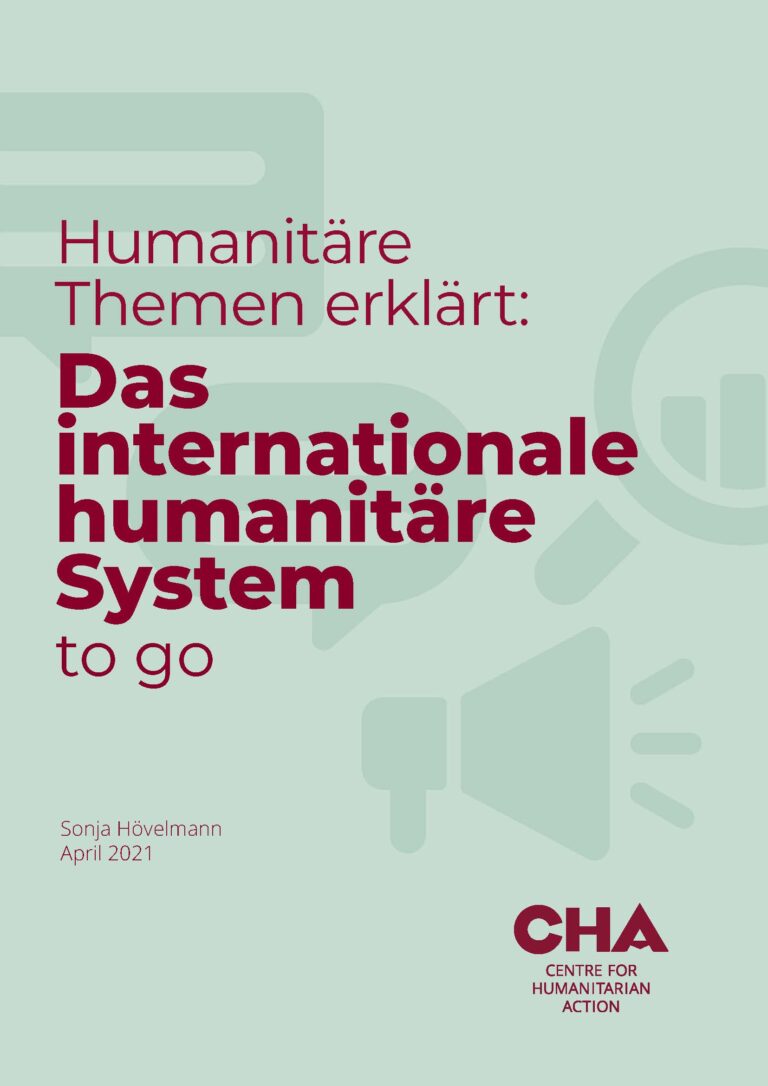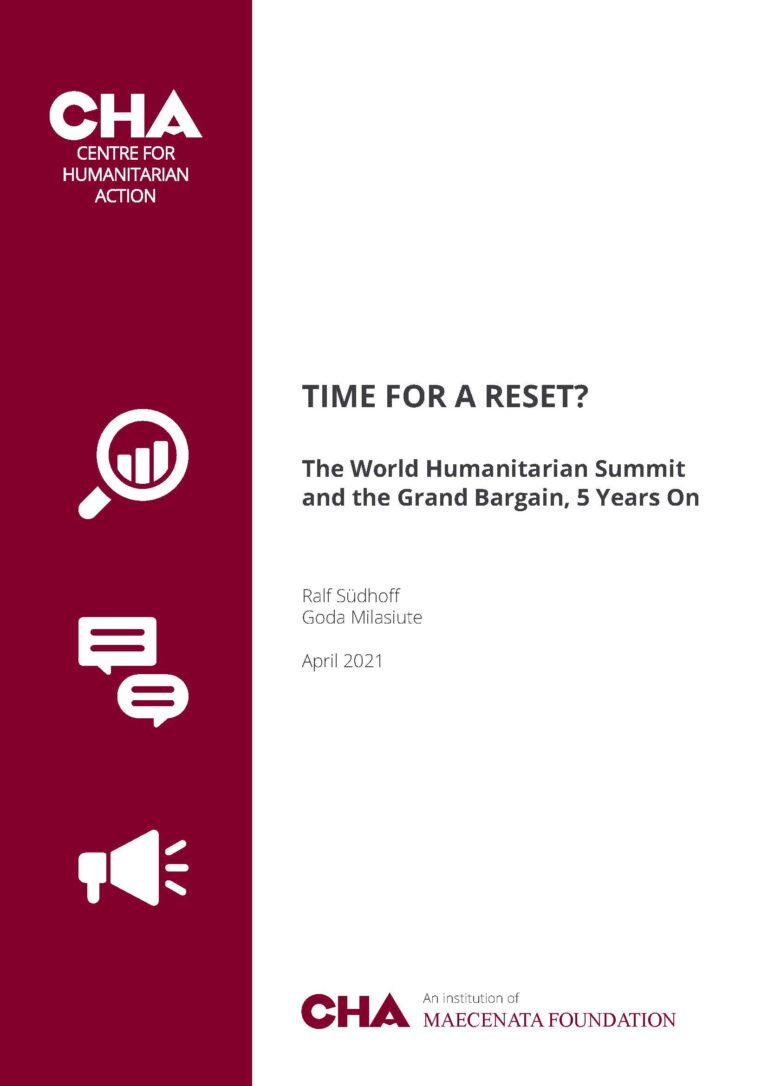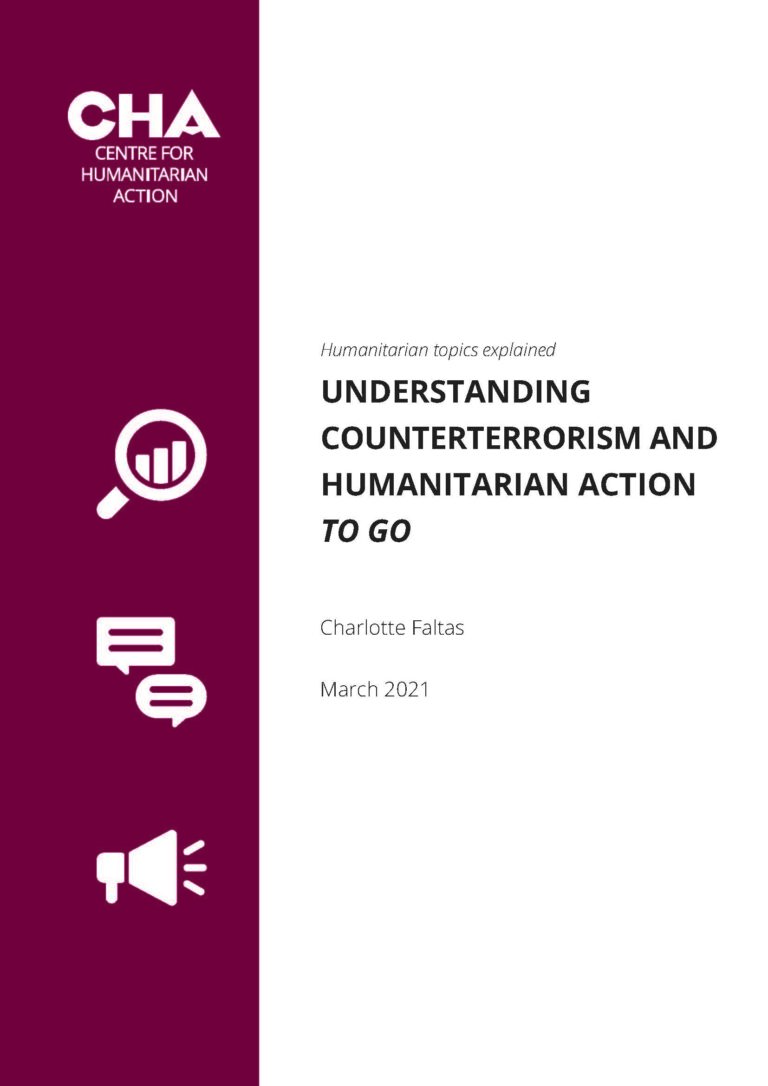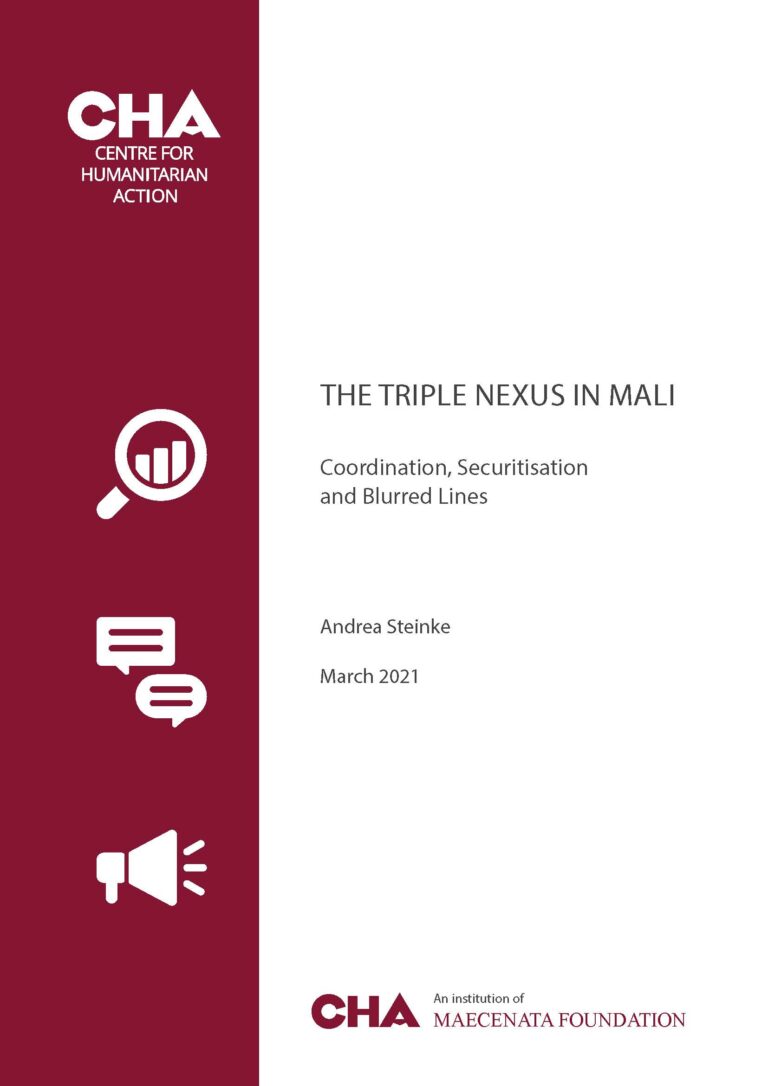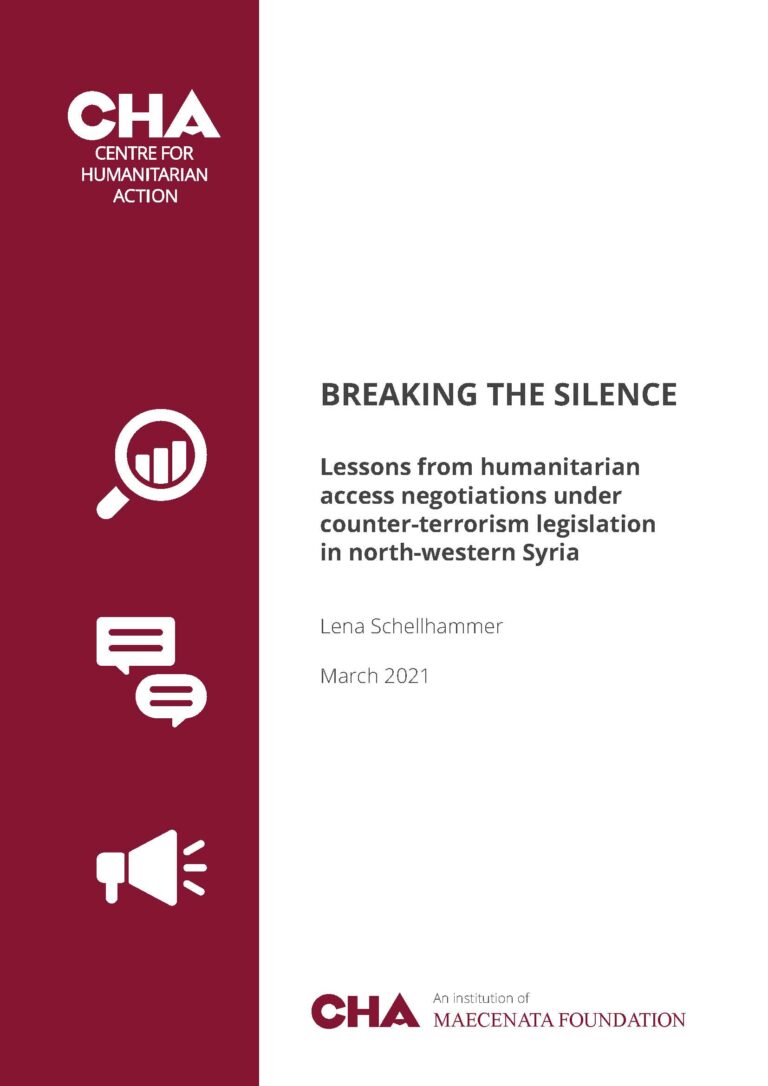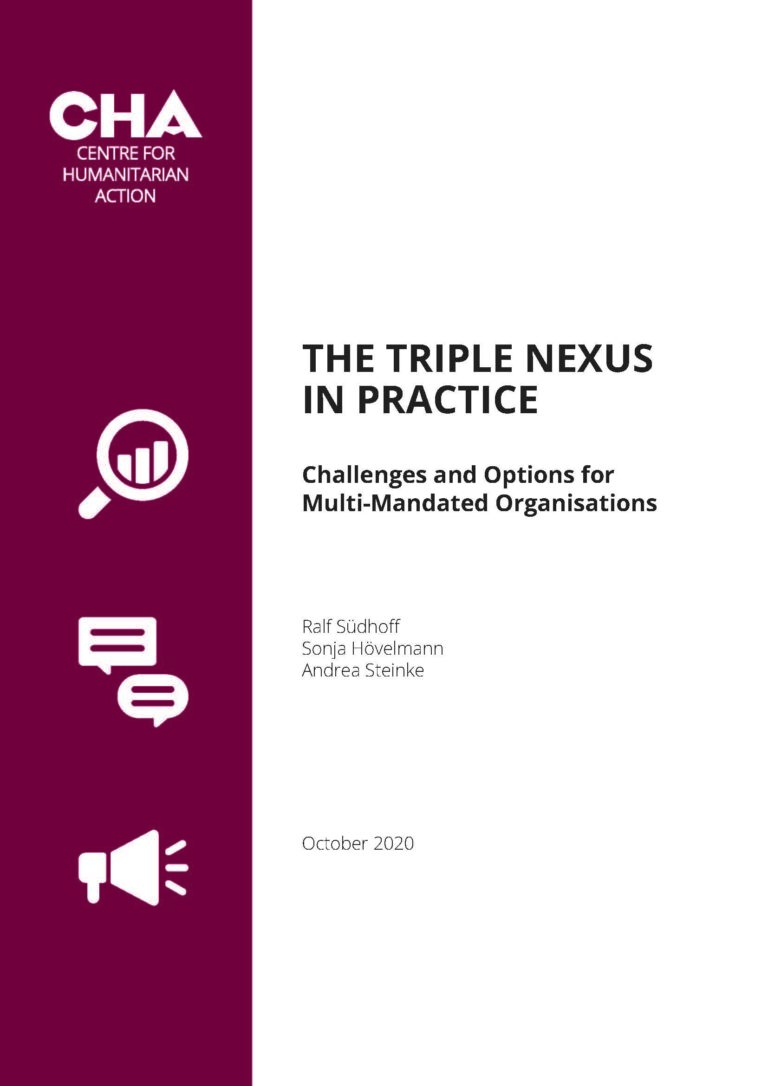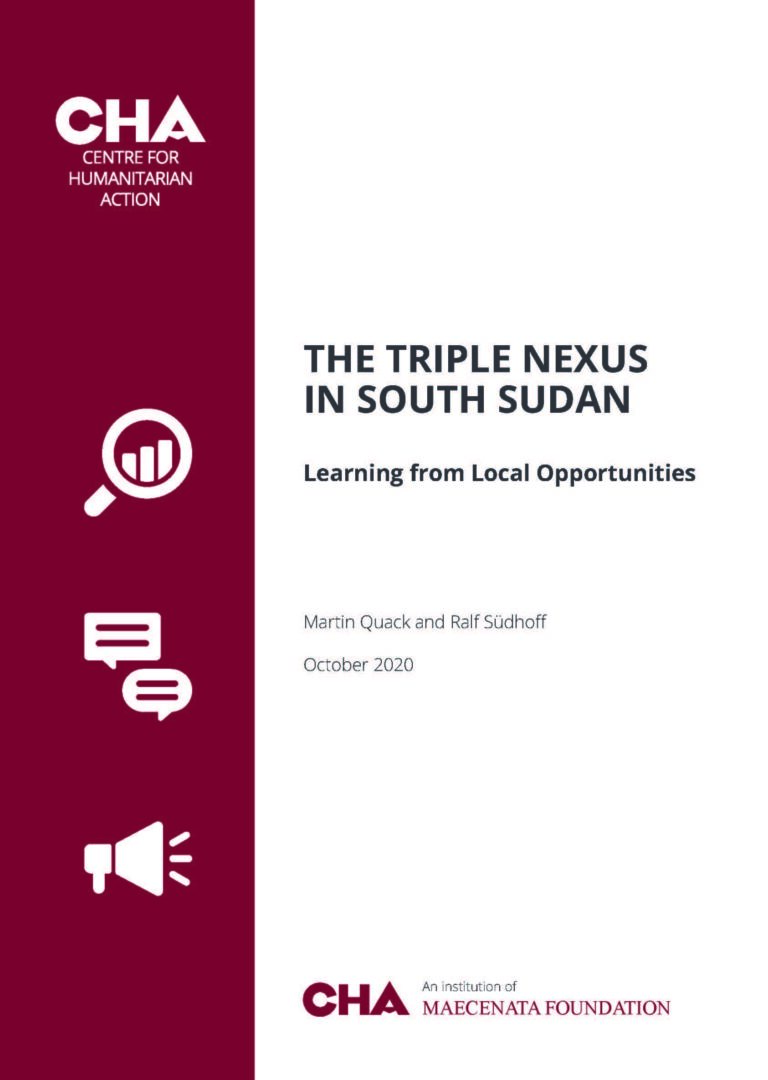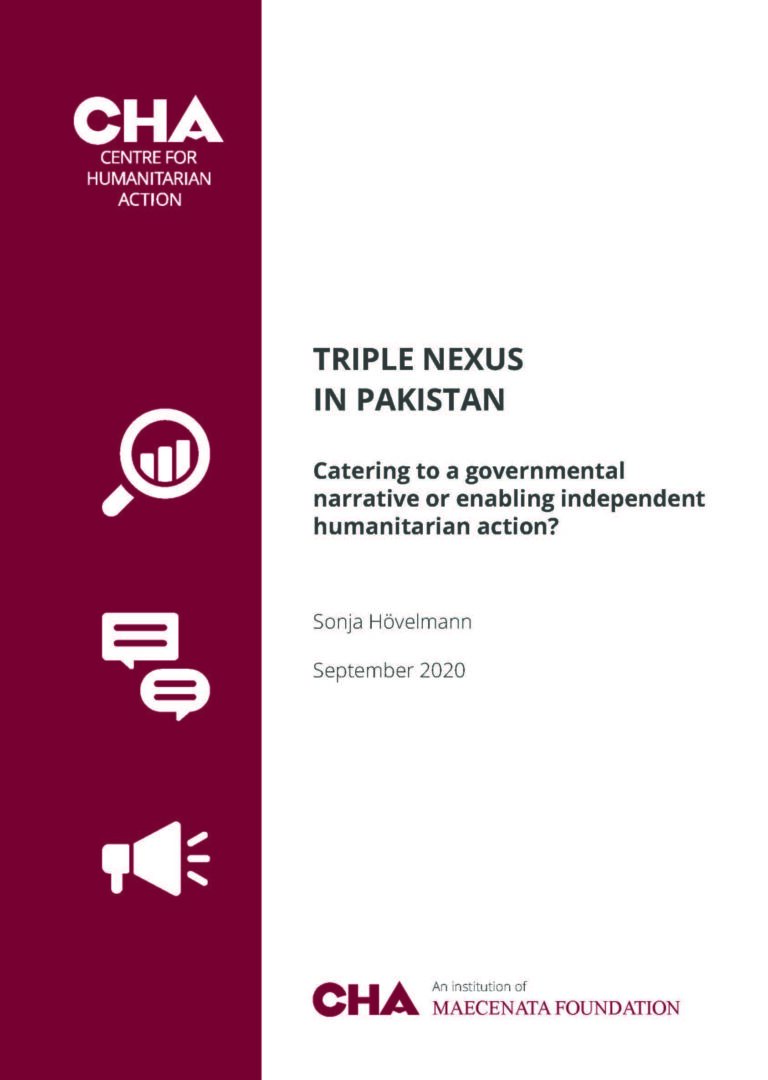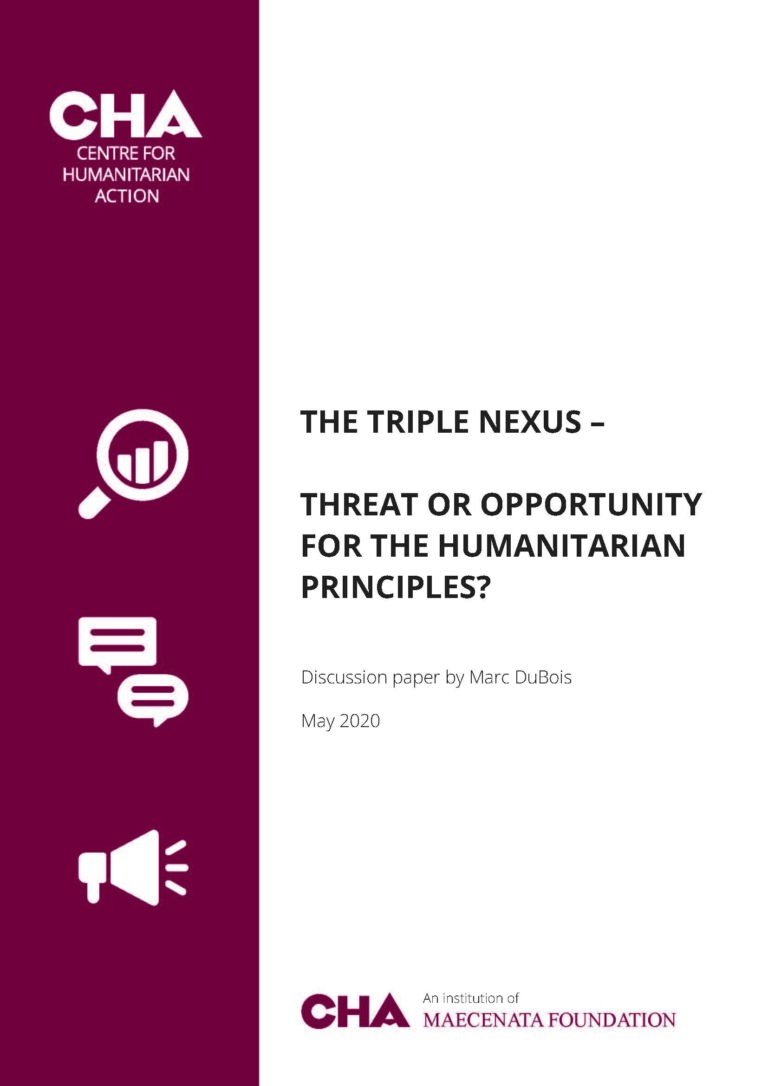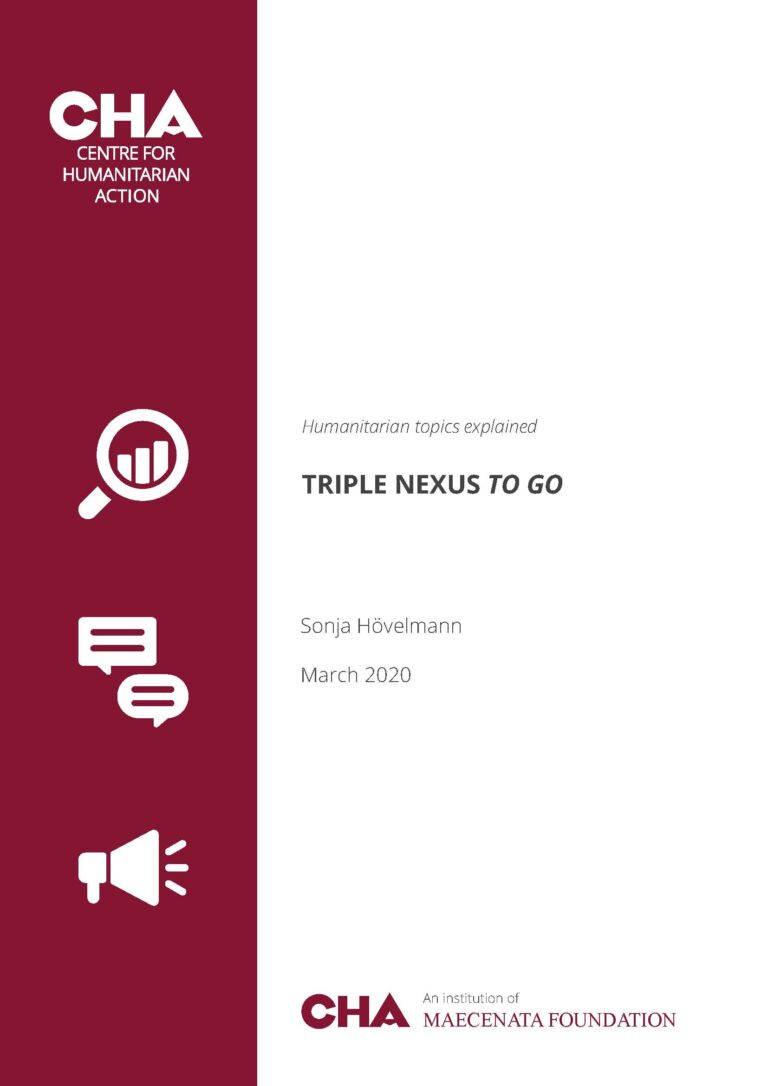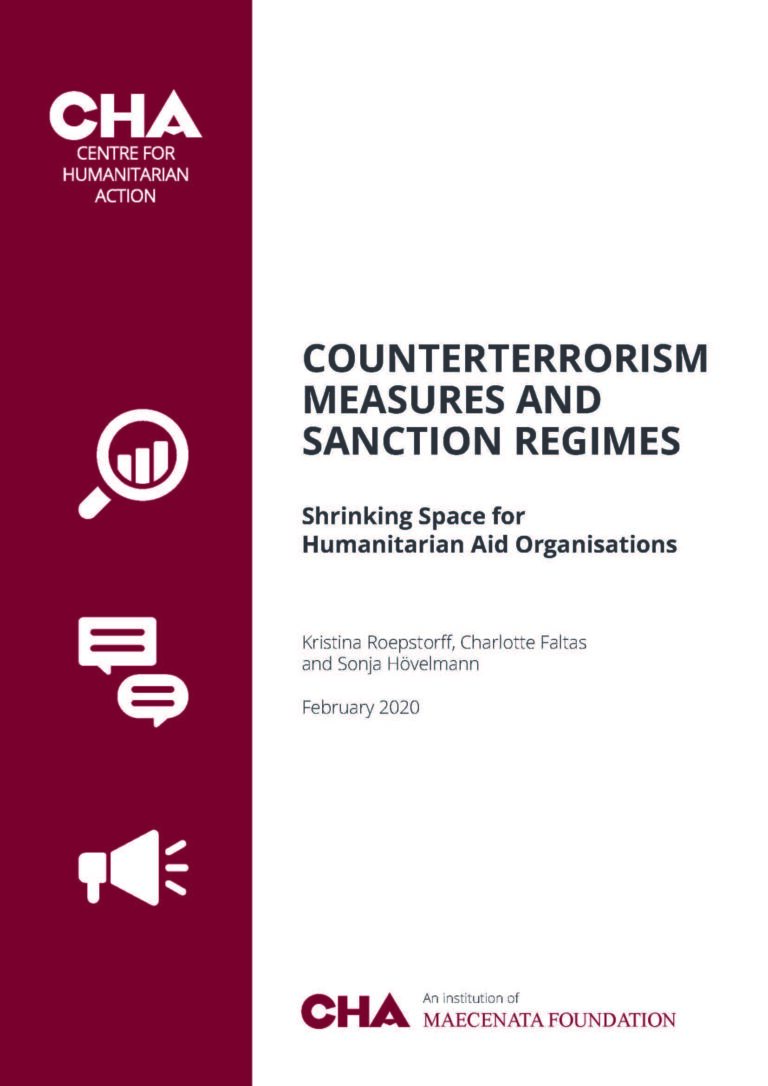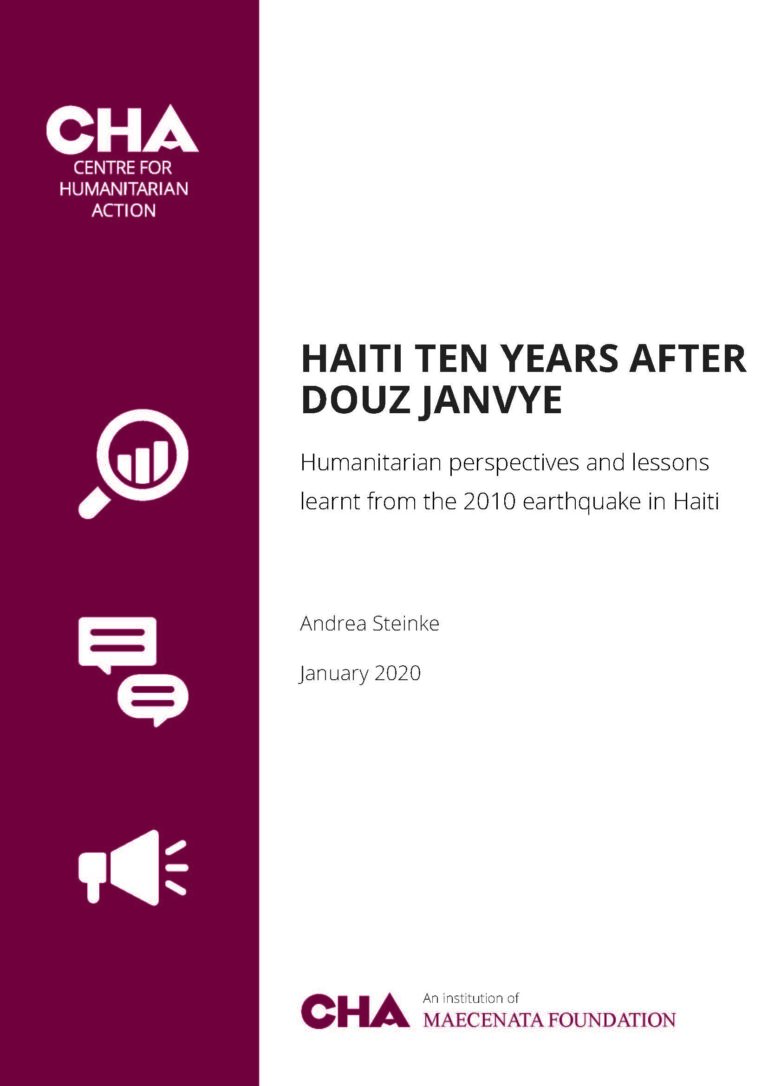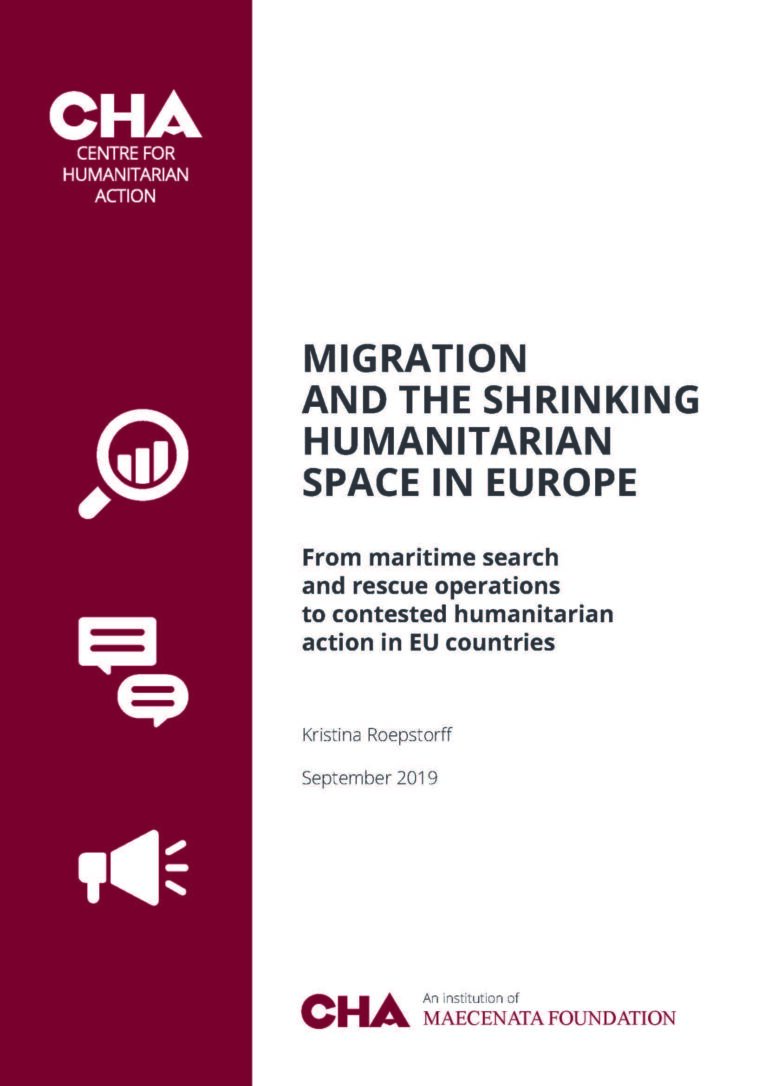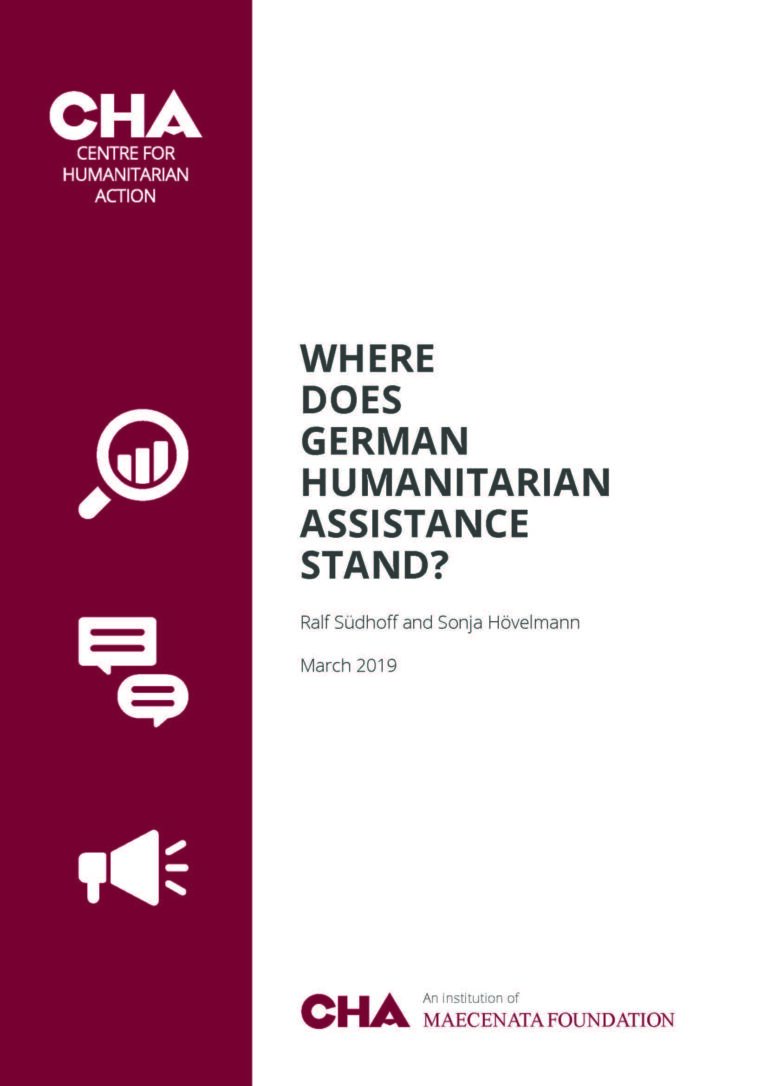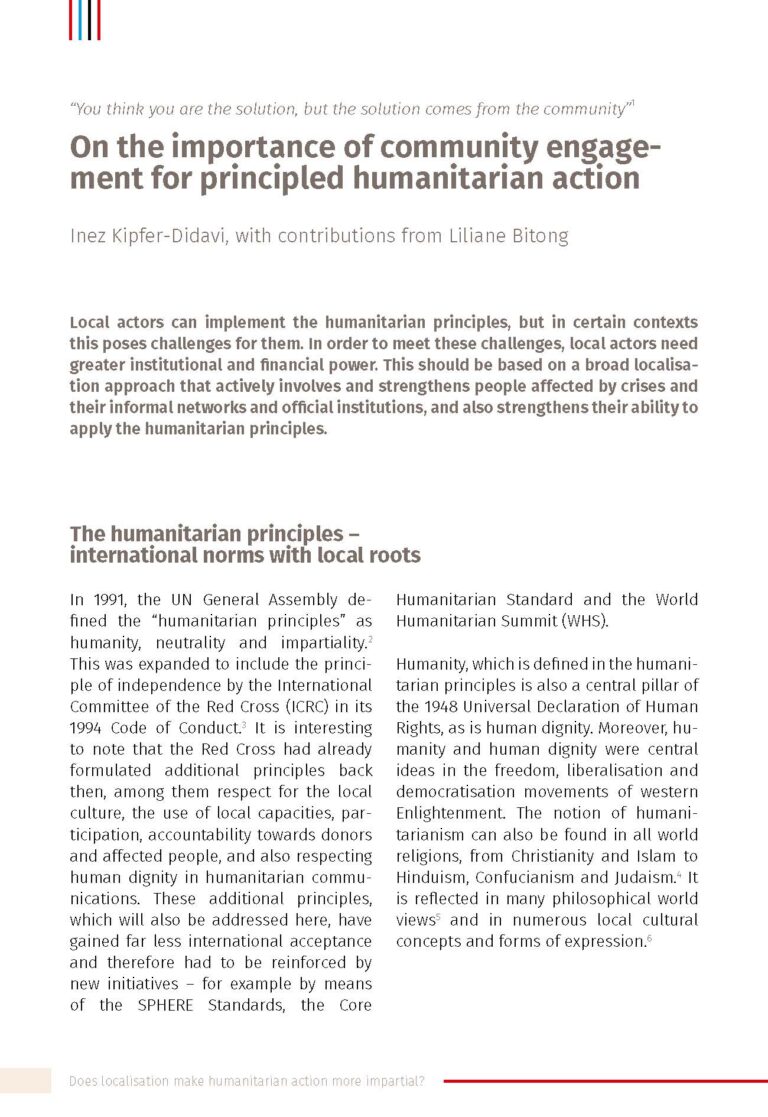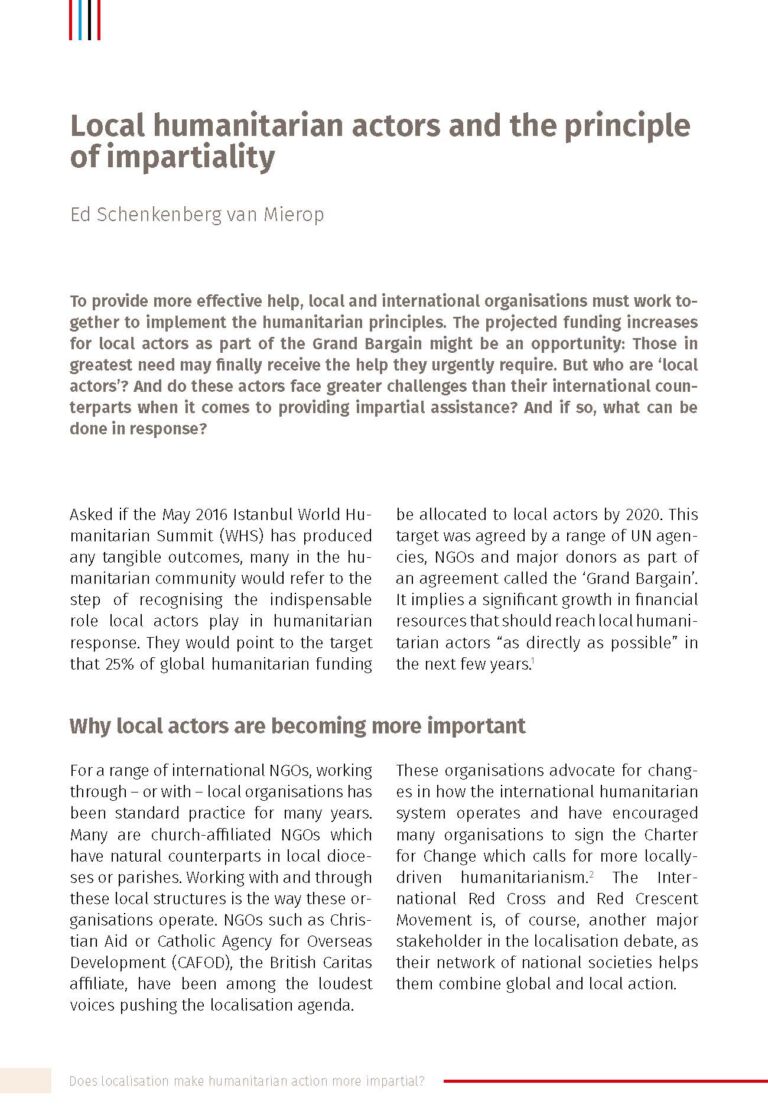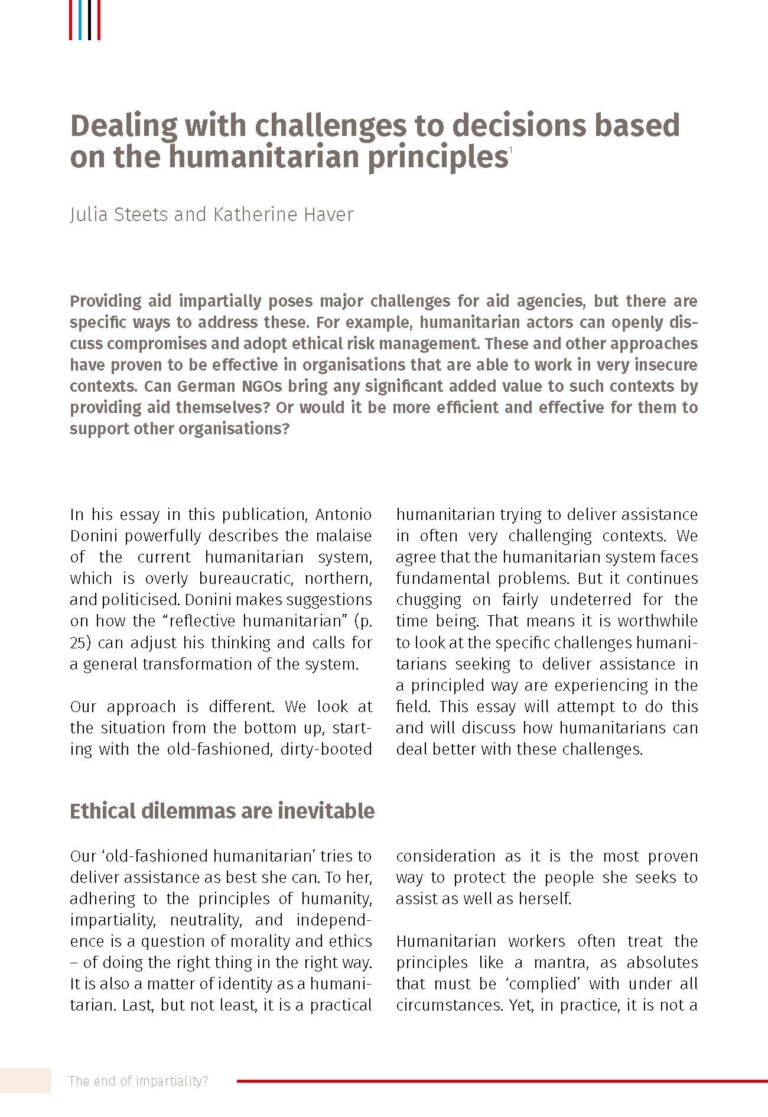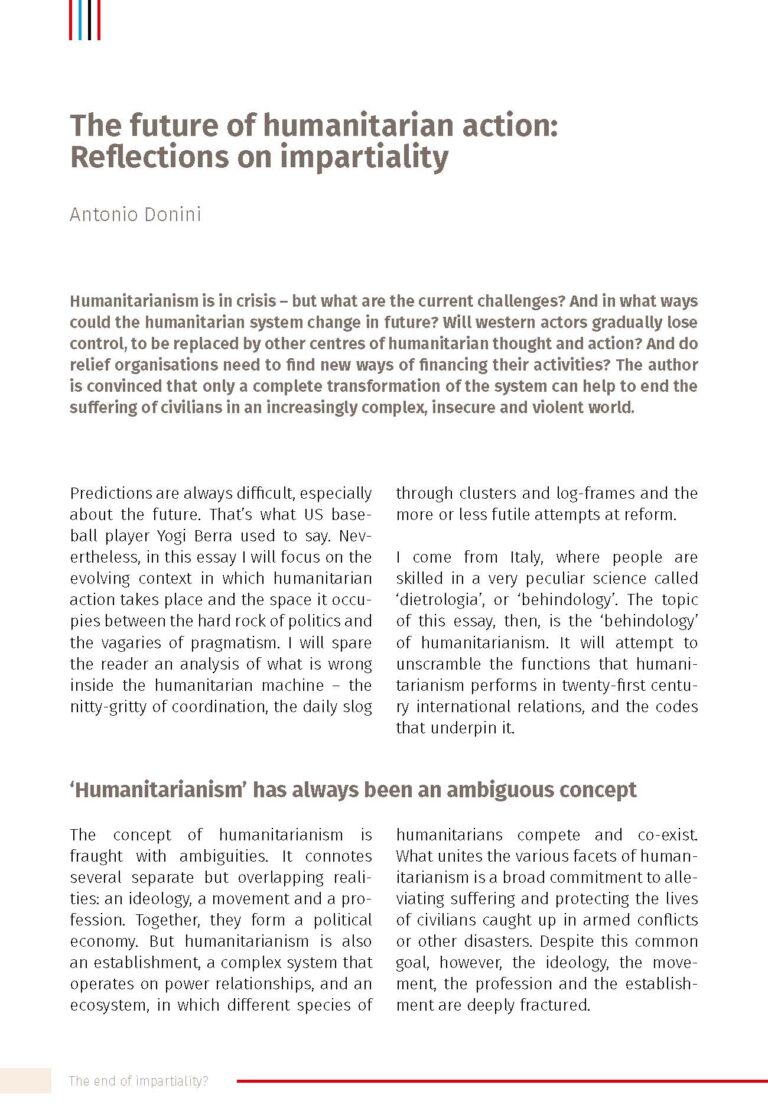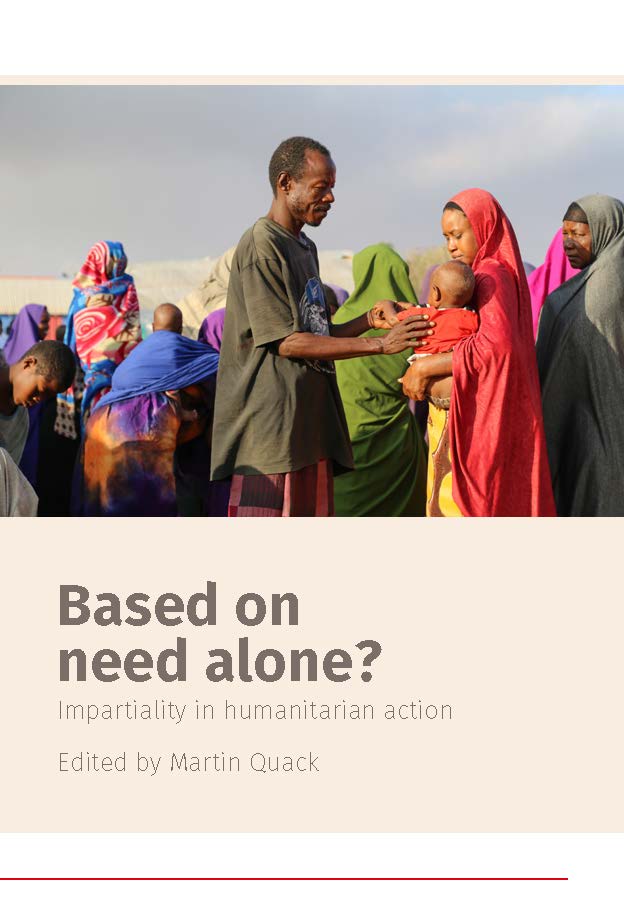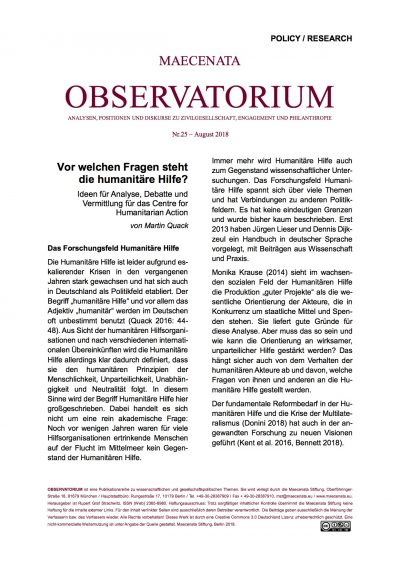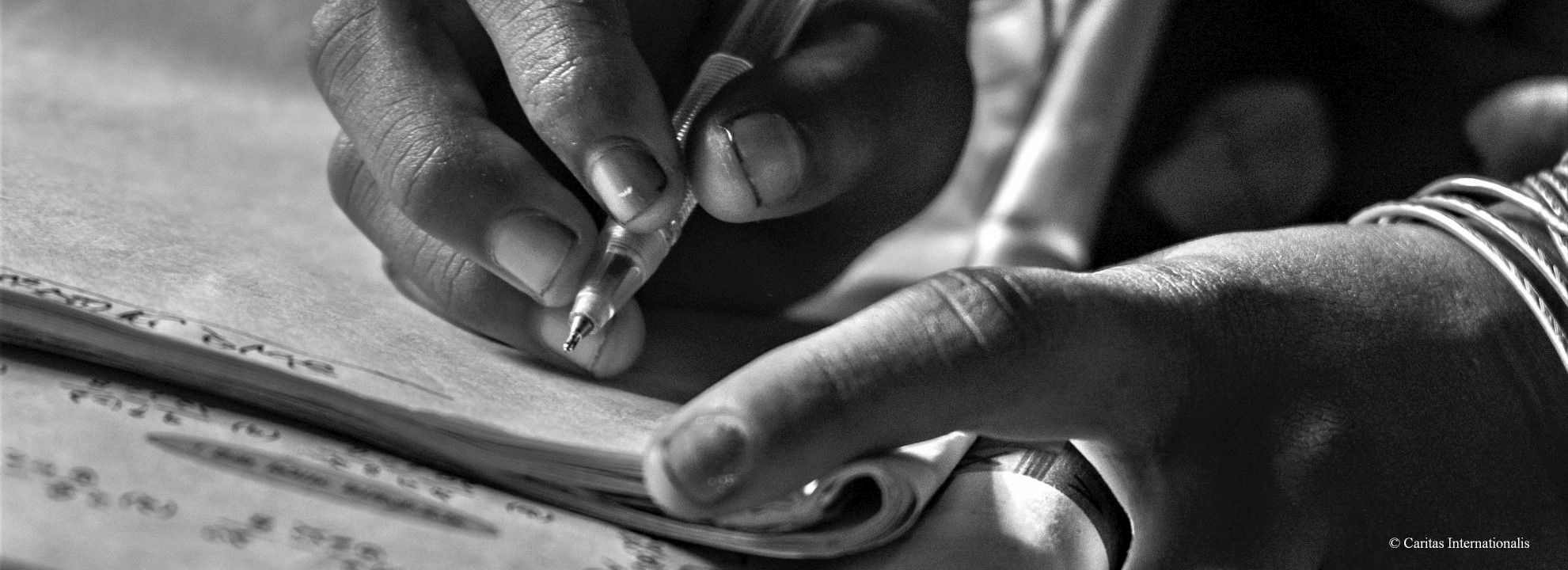
Publications
The fading of the Humanitarian Reset
by Ralf Südhoff (16.10.2025)Where does the humanitarian community stand after the announcement that all US aid funding would be stopped? Why is the Humanitarian Reset already threatened to fail? How can top donor governments still prevent this? CHA Director Ralf Südhoff analyses the progress and obstacles to reform and presents a fair share model for international humanitarian budgets.
Balancing innovation, efficiency, and principled humanitarian action
by Andrea Düchting; Darina Pellowska (31.08.2025)Andrea Düchting and Darina Pellowska explore the complex space where humanitarian innovation balances opportunity and risk, performance and principles.
The Anticipatory Turn
by Dr Iida-Maria Tammi (07.07.2025)The humanitarian community has turned to early and forward-looking aid provision as a way to manage the effects of climate change. In this paper, CHA Research Fellow Dr Iida-Maria Tammi analyses the ethical and policy implications of this ‘anticipatory turn’ in international humanitarian affairs.
CHA Policy Brief: Humanitarian action in a state of shock
by Sonja Hövelmann; Ralf Südhoff (20.05.2025)The abrupt withdrawal of the United States, which has been by far the largest humanitarian donor to date, is putting the humanitarian aid system to a crucial test. This CHA Policy Brief describes how Germany can fulfil its responsibility and prevent a collapse of the humanitarian system through strategic and focused measures, even without financially replacing the current top donor, USA.
Successfully Scaling Humanitarian Innovation
by Andrea Düchting (20.02.2025)Why do some humanitarian innovations fail while others succeed? Andrea Düchting examines the interconnectedness of successful scaling and failure, and outlines factors of success. More...
A shrinking humanitarian marketplace
by Damian Lilly, Mark Bowden (19.12.2024)Humanitarian organisations are in the business of saving lives, not making a profit. Nevertheless, the humanitarian system does display characteristics of an economic marketplace. Damian Lilly and Mark Bowden suggest that it is only by addressing the economic incentives that shape the humanitarian system that progress can be made to reform it.
More than Money
by Dr Iida-Maria Tammi (11.10.2024)Climate finance has fallen short of its humanitarian promise. Not only is there a shortage of funds, but they often fail to reach individuals and groups most vulnerable to the adverse effects of climate change. In this paper CHA Research Fellow Iida-Maria Tammi analyses the causes and (humanitarian) effects.
Digitalisation in humanitarian action – to go
by Andrea Düchting (15.07.2024)Today, humanitarian action is increasingly digital, marked by the widespread adoption of digital technologies.. In this to go - paper, Andrea Düchting explains several aspects, from new actors and ways of working to the particular challenges of digital transformation in the humanitarian sector and future prospects.
CHA Policy Brief: Loss and Damage
by Dr Andrea Steinke (28.05.2024)The intricacies between humanitarian and climate action are crucial for the future of both sectors. This policy brief aims to outline the humanitarian perspectives in the policy field of Loss and Damage.
Influencer Europe
by Ralf Südhoff (15.03.2024)How is European humanitarian policy currently coordinated? Ralf Südhoff identifies structural weaknesses, outlines ten recommendations for improved coordination processes and five potential topics of reform. More...
Localisation in practice II: Implementing Risk Sharing in humanitarian action
by Darina Pellowska, Johanna Fipp (17.01.2024)Risks in humanitarian aid are multifaceted. They are often systematically assessed, but rarely tackled as a joint effort. CHA Research Fellow Darina Pellowska, together with Johanna Fipp, shows a variety of practical Risk Sharing activities. More...
The digital capacity of German humanitarian action
by Andrea Düchting (18.12.2023)CHA Research Fellow Andrea Düchting examines the digital humanitarian capacity of German humanitarian actors and their preparedness to respond to future digital trends. More...
Unfulfilled Promises
by Goda Milasiute (05.12.2023)In this report for Caritas Europa CHA research fellow Goda Milasiute analyses the considerable disparity between rhetoric and reality in supporting local humanitarian organisations. More...
Climate Change and Humanitarian Change
by Dr Andrea Steinke (23.11.2023)Climate change is poised to reshape the humanitarian sector. CHA Research Fellow Andrea Steinke investigates three central areas of adaption. More...
Principled Payer, but Purposeful Player?
by Sonja Hövelmann and Ralf Südhoff (19.10.2023)Against the backdrop of Germany‘s evolvement as a top 2 donor, this paper is dedicated to analysing international perceptions of German humanitarian engagement in the areas of motives and interests, potentials, and impact. More...
Germany’s rise as a humanitarian donor
by Corinna Kreidler, Sonja Hövelmann and Alexandra Spencer (11.10.2023)Germany’s rise to becoming the second-largest humanitarian donor is exceptional in the humanitarian system. How have narratives at play amongst the population, media, government and aid agencies enabled and justified the significant increase in Germany’s humanitarian assistance budget? More...
World Food Crisis
by Ralf Südhoff, Berit Reich (21.07.2023)While Russia's war against Ukraine and subsequent export blockades have led to an aggravation of the crisis, the root causes of the world food crisis lie in the structural fragility and injustice of the global food system, argue Ralf Südhoff and Berit Reich.
Forgotten Crises – to go
by Eddo Westland (05.05.2023)In the current #Into Focus campaign, attention is being drawn to so-called "forgotten crises". But where does the term come from? What are the definitions and criteria? This to go -Paper introduces the topic.
Leadership and humanitarian change
by GELI and CHA (15.03.2023)The demands on leaders in the humanitarian sector in today’s crises are more challenging and complex than ever before. The analysis of six research institutions on key leadership topics in one compilation.
Localisation in Practice
by Darina Pellowska (28.02.2023)How can humanitarian action be conducted "as locally as possible"? In this research paper, CHA Fellow Darina Pellowska discusses agile management models that involve management structures more capable to facilitate equitable partnerships and presents practical recommendations on how to implement equitable partnership and agile management.
Digital Accountability
by Andrea Düchting (23.02.2023)How do humanitarian organisations take responsibility when using digital technologies? How do they hold themselves accountable? In this research paper, CHA Fellow Andrea Düchting analyses the tension between digital technologies, participation and accountability.
CHA Statement on the report of the Federal Government on German humanitarian assistance
by Sonja Hövelmann and Ralf Südhoff (16.01.2023)CHA statement on Germany's role in the humanitarian system, the status of the Grand Bargain, international organisations and local actors, and the growing food insecurity.
CHA Policy Brief: Where does the Grand Bargain 2.0 stand?
by Sonja Hövelmann (13.10.2022)The policy brief provides an overview of where the Grand Bargain 2.0 stands after one year, the results the working groups have produced, and the role and contributions Germany is taking on.
Foresight Project: The future of humanitarian action
by Lena Görgen (IRC), Sonja Hövelmann (CHA) (17.06.2022)With the federal elections in 2021, a change of policy is also imaginable in the area of German foreign policy. Based on four scenarios for future humanitarian action from Germany, which were developed in advance with input from the participants and experts, a workshop was held to work out what effects this could have on German humanitarian action and how humanitarian actors could react together. The findings of the workshop were documented.
Humanitarian action of the United Nations – to go
by Sonja Hövelmann (06.05.2022)Humanitarian assistance is a core task of the United Nations. In this To Go paper, Sonja Hövelmann explains UN actors, their tasks, funding and challenges. [German]
Whose health matters?
by Andrea Steinke, Sonja Hövelmann (28.10.2021)Mistrust and resistance against health interventions is often explained as a lack of knowledge and reason. By analysing three case studies Andrea Steinke und Sonja Hövelmann argue, however, that political-economic origins, post-colonial continuities and neo-colonial practices are strong determinants that coin the relationships in global health interventions.
Introduction to the international humanitarian system
by Sonja Hövelmann (26.05.2021)Humanitarian aid - what is it and how does it work? Sonja Hövelmann explains this in her latest paper from the CHA publication series 'to go'. For all those who want to brush up on the basics - or who have always wanted to explain to friends and family what they do in their daily work. [German]
Time for a Reset? The World Humanitarian Summit and the Grand Bargain, 5 Years On
by Ralf Südhoff, Goda Milasiute (06.05.2021)The year 2021 could be an important turning point for global humanitarian aid as well as the Grand Bargain (GB). In the latest CHA publication, Ralf Südhoff and Goda Milasiute analyse what the global initiative has achieved so far, what the German government and civil society have contributed to it and what the challenges are for a possible "GB 2.0".
Understanding counterterrorism and humanitarian action – to go
by Charlotte Faltas (14.04.2021)Since 9/11, sanctions and so-called counter-terrorism measures have increased. This also makes the work of humanitarian aid workers more difficult. Former CHA intern Charlotte Faltas explains what counter-terrorism measures are all about and how they collide with humanitarian action in a new paper in the publication series "Humanitarian topics explained ... to go".
The Triple Nexus in Mali: Coordination, Securitisation and Blurred Lines
by Andrea Steinke (22.03.2021)The current situation in Mali – protracted displacement crisis, armed conflict, staggering rates of food insecurity - is a case in point for the problems envisioned to be tackled by the Triple Nexus approach with its primary intention to “leave no one behind” by better aligning humanitarian, development and peace activities. Andrea Steinke, Research Fellow at CHA, also addresses the Malian context as a looking glass for the variety of challenges and dilemmas inscribed into the concept of the Triple Nexus.
Breaking the silence: Lessons from humanitarian access negotiations under counter-terrorism legislation in north-western Syria
by Lena Schellhammer (04.03.2021)15 March 2021 marks the tenth anniversary of the Syrian crisis. In our new publication, Lena Schellhammer from the Syrian NGO Maram Foundation analyses how Western counter-terrorism measures are affecting humanitarian negotiations in Syria and weakening aid workers' access to people in need. Have a look!
The Triple Nexus in Practice: Challenges and Options for Multi-Mandated Organisations
by Ralf Südhoff, Sonja Hövelmann and Andrea Steinke (22.10.2020)To take a strategic decision on the way forward, aid agencies are advised to look into three spaces identified by the CHAvocado model: The organisational internal space, the local civil space, as well as the macro space including international actors. Building on this spatial analysis, this research has identified three options for aid organisations on how to engage in the Triple Nexus: a core approach, a proactive approach, and a criteria-based local approach and their respective pros and cons.
Triple Nexus in South Sudan: Learning from Local Opportunities
by Martin Quack und Ralf Südhoff (21.10.2020)South Sudan is a poignant case study for understanding the opportunities and the more controversial ideas within the Triple Nexus. The characteristics of the protracted crisis in the country, its root causes and the long-standing experience with a pragmatic, integrated approach on community level make the Triple Nexus for local actors an interesting way forward.
Triple Nexus in Pakistan: Catering to a governmental narrative or enabling independent humanitarian action?
by Sonja Hövelmann (06.10.2020)Pakistan – an interesting case to study the so-called Triple Nexus approach, given the country’s frequent exposure to climate-related disasters and to extensive experience in civil-military cooperation. In this paper, CHA Research Fellow Sonja Hövelmann traces contingencies of previous humanitarian interventions in Pakistan and analyses how they shape today’s relations among different stakeholders critical for effective collaboration under a Triple Nexus framework.
Localisation and Shrinking Civic Space: Tying up the Loose Ends
by Kristina Roepstorff (15.05.2020)The call for localising humanitarian action has gained momentum. What is meant by 'local' - and how do humanitarian actors deal with the increasing curtailment of their space for action? A critical glance in the new paper by CHA Fellow Dr Kristina Roepstorff.
Triple Nexus – Threat or Opportunity for the Humanitarian Principles?
by Marc DuBois (07.05.2020)In this CHA discussion paper, Marc DuBois outlines the potential for the Triple Nexus to improve the humanitarian sector’s operational impact and its respect for its principles.
Triple Nexus – to go
by Sonja Hövelmann (30.03.2020)In CHA's new publication series "... to go", complex topics of humanitarian assistance are explained briefly and easily understandable. In this first issue, the much-discussed and at the same time often vague, undefined Triple Nexus is to be unravelled.
Counterterrorism Measures and Sanction Regimes: Shrinking Space for Humanitarian Aid Organisations
by Kristina Roepstorff, Charlotte Faltas, Sonja Hövelmann (27.02.2020)In recent decades, states and intergovernmental organisations have adopted increasingly restrictive laws and guidelines to combat terrorism. Humanitarian actors report disastrous effects on their daily work. This publication introduces the current state of the debate.
Haiti Ten Years After Douz Janvye
by Andrea Steinke (31.01.2020)Ten years after the devastating earthquake in Haiti, many Haitians want to break with a system that is reproduced by the humanitarian community. In her latest publication, CHA Research Fellow Andrea Steinke takes a closer look at the humanitarian situation in the country - and draws a critical balance.
Migration and the Shrinking Humanitarian Space in Europe
by Kristina Roepstorff (15.10.2019)Our new research fellow Kristina Roepstorff discusses the problem of the shrinking humanitarian space in Europe. Besides the well-known obstacles to civil search and rescue operations, the humanitarian space is also affected by various other controversial measures in EU countries.
Where does German humanitarian assistance stand?
by Ralf Südhoff and Sonja Hövelmann (08.03.2019)Germany has positioned itself as the second largest donor country, which is of extremely great value in times of a rapidly growing number of people in need. However, Germany’s financial engagement and its policy and strategy capacities have not grown at the same pace. Staffing as well as structural issues prevent Germany to fulfill its potential as a leading humanitarian actor.
Localisation and the humanitarian principles – the relevance of community engagement
by Inez Kipfer-Didavi, with contributions from Liliane Bitong (01.05.2018)Local actors can follow the humanitarian principles, but in certain contexts this poses substantial challenges for them. In order to meet these challenges, local actors need greater institutional and financial power and a broad localisation approach is needed.
Local aid and international agencies – a matter of conflict and contradiction?
by Ed Schenkenberg van Mierop (01.05.2018)The projected funding increases for local actors as part of the Grand Bargain might be an opportunity: Those in greatest need may more effectively receive the help they urgently require. But who is a local actor? Do they face greater challenges as international agencies in providing impartial and neutral assistance? Is the much discussed issue of local or international actors always the right one, or is it often more important to look at actors abilities?
Providing assistance in conflict and respecting humanitarian principles – two opposing goals?
by Julia Steets and Katherine Haver (01.05.2018)Providing assistance in an impartial way poses major challenges for aid agencies in particular conflict settings. However, there are ways to address these. For example, humanitarian actors can openly discuss compromise options and adopt ethical risk management systems.
The future of humanitarian action: Reflections on impartiality
by Antonio Donini (01.05.2018)Humanitarianism is in crisis – but what are the current challenges? And in what ways could the humanitarian system change in future? Will western actors gradually lose control, to be replaced by other centres of humanitarian thought and action?
Based on need alone?
by Martin Quack (Ed.) (01.05.2018)Humanitarian organisations are bound to the principle of impartiality. This means that actions must be carried out on the basis of need alone. They must be focused on the neediest, regardless of their ethnicity or political or religious beliefs. In theory, this is clear and logical – but humanitarian workers experience on a daily basis how difficult it is to apply this principle in reality.
The challenge of humanitarian action
by Martin Quack (01.01.2016)What characterises good humanitarian action? How independent can and should it be? How important are humanitarian principles and how do we implement them in practice? Again and again it becomes clear to us that in Germany we have relatively little debate on these issues. Why is that? What obstacles need to be removed and what capacities need to be created? Where are the biggest challenges on the way to more critical reflection and debate? This study examines these challenges. It attempts to take stock and analyses the deficits in Germany. At the same time, it is intended to create the basis for further reflection and debate and, in the process, to initiate concrete initiatives in this direction.
What issues does humanitarian action face?
by Martin Quack (01.08.2018)Ideas for analysis, debate and mediation for the Centre for Humanitarian Action (CHA).


